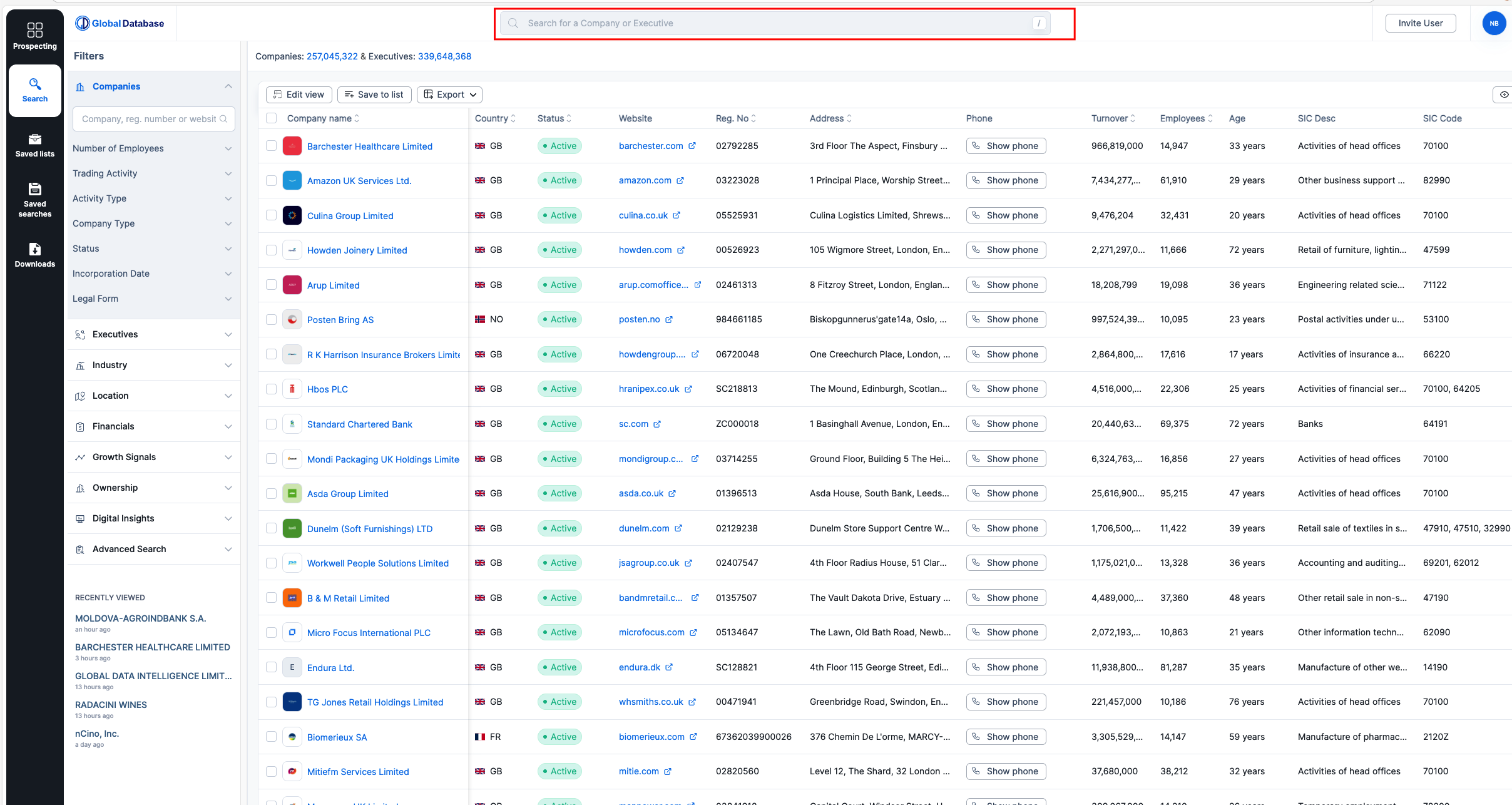1. Introduction
Europe is one of the most complex regions in the world when it comes to accessing verified company information. Unlike the United States, which uses a standardized network of Secretary of State registries, Europe is a patchwork of 40+ different jurisdictions, each operating its own official company register, often in its own language, with different rules, access levels, and data formats.
Every business operating in Europe—whether for KYB verification, AML compliance, due diligence, supplier onboarding, credit risk assessment, investment research, or sales intelligence—eventually reaches the same challenge:
“Where do I find the official company information for this country?”
There is no single European registry that covers all countries.
Even within the European Union, there is wide variation:
Some countries provide fully open company data (e.g., Denmark, Estonia).
Others offer paid access, limited details, or PDF-only filings.
Some publish financial statements; others do not.
Only a handful provide beneficial ownership (UBO) data publicly.
Several countries operate multiple parallel registries for legal, financial, and corporate announcements.
For companies expanding across Europe, onboarding international clients, verifying suppliers, or conducting large-scale risk assessments, navigating these registries becomes time-consuming and confusing.
Why This Directory Exists
This article serves as the most complete, up-to-date directory of official company registries and government data sources across every European country — EU and non-EU:
✔ All 27 EU Member States
✔ EEA Countries (Norway, Iceland, Liechtenstein)
✔ United Kingdom & Switzerland
✔ Western Balkans
✔ Türkiye, Ukraine, Moldova, Georgia, Armenia, Azerbaijan
✔ Microstates (Andorra, Monaco, San Marino, Vatican City)
✔ Eurasian territories commonly included in European data coverage
For each country you will find:
Official registry name
What the registry contains (legal data, filings, financials, directors, shareholders, UBO availability, etc.)
Registry access model (free, paid, partially restricted)
Link to the government registry
Brief description of how the registry works
This directory is designed as a practical reference guide for compliance teams, financial institutions, risk analysts, procurement teams, law firms, investors, and professionals who rely on accurate, government-verified business information.
How to Use This Directory
Each country section follows the same structure for easy scanning:
Brief Description
What Data Is Available
Official Government Registry Link
Notes (UBO access, filing rules, language, update frequency, etc.)
Whether you're verifying a supplier in Italy, checking the legal status of a company in Germany, or performing due diligence on a Swiss firm, this directory provides the fastest route to the official source.
3. Directory of Official Company Registries in Europe (By Country)
3.1 Albania Business Directory Official Registry: National Business Center (Qendra Kombëtare e Biznesit – QKB)
Official Registry: National Business Center (Qendra Kombëtare e Biznesit – QKB)
Brief Description
Albania’s National Business Center (QKB) is the government authority responsible for registering all business entities operating in the country. Formed through the consolidation of the former National Licensing Center and National Registration Center, QKB serves as the central hub for corporate registration, licensing, and publication of legal updates. It provides one of the more transparent and modernized registries in the Western Balkans, offering digital access to core company information.
1. What Data Is Available in Albania
The Albanian company register provides access to the following:
Legal company name
Unique business identification number (NIPT)
Legal form
Registered address
Company status
Founders and shareholders
Administrators and legal representatives
Registered activities (NACE codes)
Articles of association
License information (where applicable)
Historical changes and amendments
2. Financial statements in Albania:
Annual financial statements are published for entities required to file them. Availability varies by company type.
3. UBO information in Albania:
Albania has implemented a Beneficial Ownership Register, but access is limited to obliged entities and certain authorized users. It is not fully public.
Official Registry Link
National Business Center (QKB): https://qkb.gov.al/
3.2 Andorra Business Directory Official Registry: Registre de Societats (Companies Register of Andorra)
Official Registry: Registre de Societats (Companies Register of Andorra)
Brief Description
The Registre de Societats is Andorra’s official corporate registry, responsible for recording all legal entities established or operating in the Principality. In recent years, Andorra has updated its company and AML/beneficial ownership legislation to align with international transparency standards.
However, public access remains more limited than in EU states. Core company details are accessible, but deeper ownership and financial information generally require authorised access or a demonstrated legitimate interest.
What Data Is Available in Andorra
1. Legal & Corporate Information:
Company name
Legal form (SL, SA, etc.)
Registration number
Registered address
Company status (active/dissolved)
Directors and legal representatives
Share capital and filed corporate structure
2. Beneficial Ownership (UBO) in Andorra:
Andorra operates an official Beneficial Ownership Register.
Companies must identify individuals who own or control them (typically 25%+).
Access to UBO data is restricted to competent authorities, regulated entities, and those with legitimate interest.
Full UBO details are not publicly visible.
3. Financial Statements in Andorra:
Companies must prepare annual financial statements.
Filing obligations vary based on company type and size.
Financial statements are not publicly accessible.
Audits are required for larger entities or those exceeding certain thresholds.
Official Registry Link
Registre de Societats: https://www.registres.ad
3.3 Armenia Business Directory & Official Company Register
 Official Registry: State Register of Legal Entities – “E-Register”
Official Registry: State Register of Legal Entities – “E-Register”
Brief Description
Armenia’s State Register of Legal Entities is operated by the Ministry of Justice and serves as the country’s central authority for corporate registration. It supports electronic incorporation, amendments, ownership declarations, and public lookups of legal entities.
In recent years, Armenia has significantly strengthened its transparency framework, introducing one of the most comprehensive beneficial ownership regimes in the region. The system covers all sectors of the economy and requires detailed disclosure of ownership structures.
What Data Is Available for Armenia
1. Legal & Corporate Information:
Legal entity name
Registration number
Legal form (LLC, CJSC, etc.)
Date of registration
Registered address
Company status
Founders and shareholders
Directors and legal representatives
Ownership chain (where disclosed)
2. Beneficial Ownership (UBO) in Armenia:
Armenia maintains a mandatory UBO register.
Beneficial owners must be declared based on thresholds:
20%+ ownership for most sectors
10%+ for extractive industries
Any level of ownership/control for politically exposed persons (PEPs)
Core UBO information is publicly accessible (name, citizenship, nature and percentage of ownership, date of acquiring BO status).
Sensitive personal data is restricted.
3. Financial Statements in Armenia:
All companies must prepare annual financial statements in line with Armenian accounting standards.
Filing is mandatory; the deadline is typically July 1 of the year following the reporting period.
Large companies, public interest entities, and companies exceeding certain thresholds must undergo audits and publish their financial statements.
Smaller entities may file simplified financial statements.
Financials are filed with the authorities but are not fully open to the public for all companies.
Official Registry Link
E-Register: https://www.e-register.am
3.4 Austria Business Directory
Official Registry: Firmenbuch (Austrian Commercial Register)
Brief Description
The Firmenbuch is Austria’s official public commercial register. It is managed by the regional commercial courts under the Ministry of Justice and records all legally registered companies operating in Austria. The register includes comprehensive legal, structural, and financial information. While basic company data is publicly visible, full extracts and documents are available through authorised access points for a fee.
What Data Is Available for Austria
1. Legal and Corporate Information:
Company name
Registration number (FN)
Legal form (GmbH, AG, OG, KG, etc.)
Registered office and business address
Date of incorporation
Company status (active, dissolved, in liquidation)
Branch offices
Managing directors and authorised representatives (Prokuristen)
Supervisory board members (for entities where applicable)
Share capital and paid-in capital (for corporations)
Shareholder information for GmbH (shareholder names and ownership percentages)
Amendments to articles of association
Mergers, demergers, changes of legal form
Insolvency-related entries
Historical records (previous entries remain visible but marked as deleted)
2. Company Financial Statements in Austria:
Austrian companies must file annual financial statements with the Firmenbuch.
Filing deadline is generally nine months after the financial year-end.
The scope of required disclosure depends on company size (full, abbreviated, or simplified statements).
Large and medium-sized companies must also file management reports and auditor’s reports.
Filed financial statements are considered “published” and accessible for a fee.
3. Beneficial Ownership (UBO) – WiEReG in Austria :
Austria maintains a separate Beneficial Owners Register (WiEReG).
Key points:
Most Austrian legal entities must report their beneficial owners.
A beneficial owner is a natural person with more than 25% ownership or control, or who exercises dominant influence.
Certain core UBO data may be accessed by the public in the form of a basic extract (paid).
Full access is restricted to obliged entities (banks, lawyers, auditors, notaries) and authorities.
Austria updated UBO access rules following EU court decisions but continues to permit limited public queries.
Official Registry Link
Firmenbuch (Commercial Register): https://justizonline.gv.at/jop/web/firmenbuchabfrage
3.5 Azerbaijan Business Directory & Official Company Register Official Registry: State Tax Service – Register of Legal Entities
Official Registry: State Tax Service – Register of Legal Entities
Brief Description
Azerbaijan’s official registry of companies is maintained by the State Tax Service under the Ministry of Economy. It is the central authority responsible for the registration of all legal entities and individual entrepreneurs and provides a digital public lookup service for basic company details.
The corporate framework has undergone major reforms in 2024–2025, including a new beneficial ownership law and updated rules for how companies must report changes, making Azerbaijan’s system more aligned with international AML and transparency standards.
What Data Is Available in Azerbaijan
1. Legal and Corporate Information:
The Register of Legal Entities provides access to:
Legal entity name
Registration (taxpayer) identification number (VÖEN)
Legal form (LLC, JSC, etc.)
Registered address
Date of registration
Company status
Directors and legal representatives
Founders and shareholders (as filed)
Charter capital
Registered business activities and classification codes
Amendments to corporate details
Certain historical information
A major update in 2025 reduced the deadline for companies to report changes (such as restructuring or bankruptcy) from 40 business days to 15 business days.
2. UBO Register in Azerbaijan:
A new, comprehensive Beneficial Ownership Framework entered into force on 15 May 2025.
All legal entities, as well as branches or representative offices of foreign companies, must disclose their beneficial owners.
A beneficial owner is defined broadly, including natural persons with significant control or influence (starting from 10%+ depending on the circumstances).
The UBO information is not publicly accessible.
It is treated as confidential and available only to competent authorities, financial institutions, reporting entities, and other parties defined under AML/CTF laws.
The UBO register does not publish ownership data on the public company search portal.
3. Company Financial Statements in Azerbaijan:
Companies must prepare annual financial statements under national standards or IFRS (depending on size and sector).
Large entities, companies in regulated sectors, banks, insurers, and public interest entities are subject to mandatory audit.
While financial statements must be submitted to the authorities, they are not publicly available through the commercial register for most companies.
Public interest entities and some larger organisations must publish their audited financials, but typical private companies do not have publicly disclosed statements.
Official Registry Link
Azerbaijan Commercial Registry: https://www.e-taxes.gov.az
3.6 Belarus Official Company Register Official Registry: Unified State Register of Legal Entities and Individual Entrepreneurs (USR)
Official Registry: Unified State Register of Legal Entities and Individual Entrepreneurs (USR)
Brief Description
Belarus maintains a centralized Unified State Register of Legal Entities and Individual Entrepreneurs (USR), administered by the Ministry of Justice. It is the country’s main system for recording all companies and individual entrepreneurs, including their legal status, registration details, and key corporate data. The USR is the primary official source used by banks, compliance teams, and businesses to confirm whether a company is validly registered and active.
Basic information is available through online search tools, while full extracts containing corporate details are issued by the registration authorities upon request.
What Information Is Available in the Belarus
1. Legal and Corporate Information:
The USR contains:
Company or entrepreneur name
Registration number
Registration date
Registering authority
Legal form (LLC, JSC, etc.)
Registered address
Legal status (active, liquidation, bankruptcy, removed from register)
Information on reorganisation and termination
Founders/shareholders (in extended extracts)
Charter capital (for entities required to file it)
Management details (director or authorised representative)
Historical changes (in paid, official extracts)
Not all information is available online; the public search provides limited data, while full extracts must be officially requested.
2. UBO Register in Belarus
Belarus does not operate a public beneficial ownership register.
However:
Since 2020, companies in Belarus are legally required to identify and maintain records of their beneficial owners.
Beneficial ownership information must be provided to competent authorities (e.g., financial monitoring, tax authorities) upon request.
UBO information is not published in the commercial register and is not accessible to the general public.
Certain regulated sectors may require enhanced disclosure to supervisory authorities, but these disclosures are not publicly visible.
3. Financial Reporting in Belarus
All legal entities must maintain accounting records and prepare annual financial statements in accordance with Belarusian accounting standards.
Larger companies, public interest entities, financial institutions, and entities in regulated sectors must prepare financial statements using IFRS and are subject to mandatory audit.
Annual statements are submitted to the tax authorities, typically by 31 March of the following year.
Financial statements are not publicly available through the USR for most private companies.
Banks, insurers, and other public interest entities may publish audited financial reports through regulated channels, but this is outside the scope of the public registry search.
Official Registry Link
Unified State Register (Belarus): http://egr.gov.by
3.7 Belgium Business Directory Official Registry: Crossroads Bank for Enterprises (Banque-Carrefour des Entreprises / Kruispuntbank van Ondernemingen — BCE/KBO)
Official Registry: Crossroads Bank for Enterprises (Banque-Carrefour des Entreprises / Kruispuntbank van Ondernemingen — BCE/KBO)
Brief Description
The Crossroads Bank for Enterprises (CBE/KBO) is Belgium’s central registry of companies and establishment units. Operated by the Federal Public Service Economy, it serves as the authoritative database for identifying any legally registered organisation in Belgium. It provides one of the most transparent and structured registers in Europe, with extensive public access to both legal and financial corporate data.
What Business Data Is Available in Belgium
1. Legal & Corporate Information:
Company or enterprise number
Official company name and previous names
Legal form (e.g., SRL/BV, SA/NV, ASBL/VZW)
Registered office and any historical address changes
Company status (active, dissolved, in liquidation)
Establishment units and their activity status
Economic activity codes (NACE-BEL)
Contact and operational information for many establishment units
Details on directors, representatives, and mandates (as filed)
Information on share capital (for companies where it applies)
Links to published legal acts and filings in connected systems
2. Company Financial Statements in Belgium:
Belgian companies are legally required to file annual financial statements with the National Bank of Belgium’s Central Balance Sheet Office.
These filings include full, abbreviated, or micro-accounts depending on company size.
Large and listed entities must file full audited financial statements.
Annual accounts are available to the public (for a small fee) and can be accessed through the CBE/KBO’s connected systems.
The company register itself indicates when accounts have been filed and provides structured metadata about these filings.
Belgium operates a national UBO Register under its AML legislation.
Entities must report beneficial owners who hold 25% or more of shares or voting rights or exercise control through other means.
Annual confirmation of UBO information is mandatory.
Following the 2022 Court of Justice of the EU ruling, public access to the UBO register is restricted.
Access is now granted only to persons or organisations who can demonstrate a legitimate interest.
Obliged entities (banks, auditors, notaries, etc.) retain access for AML purposes.
Non-compliance with UBO reporting can result in significant administrative fines.
Notes & Limitations
Belgium offers one of the most complete public company registers in Europe, but full documents (financial statements, deeds, filings) may require payment.
UBO information is not openly public, unlike basic company details.
Most corporate changes (directors, articles, capital, etc.) must be filed promptly, making Belgium’s register highly current and reliable.
Official Registry Link
Crossroads Bank for Enterprises (Belgium): https://economie.fgov.be/cbe-public-search
3.8 Bosnia and Herzegovina Business Directory & Official Company Register Official Registry: Court Registers of Business Entities (Unified country-wide search portal)
Official Registry: Court Registers of Business Entities (Unified country-wide search portal)
Brief Description
Bosnia and Herzegovina operates a court-based company registry system, with registrations handled separately in:
Federation of Bosnia and Herzegovina
Republika Srpska
Brčko District
A single unified public portal aggregates the court registers from all three jurisdictions into one searchable interface. This is the authoritative source for confirming registration details, legal status, and the competent court holding the company file.
What Company Data Is Available in Bosnia and Herzegovina
1. Legal & Corporate Information (public search):
The unified register provides:
Company name
Registration number
Registering court (Federation, Republika Srpska, Brčko District)
Legal form (e.g., d.o.o., a.d.)
Registered address
Company status (active, deleted, liquidation, etc.)
Additional details such as founders, management, capital structure, articles of association, and historical filings are typically available only through official extracts requested from the relevant court. These are not free and require a formal request.
2. Ultimate Beneficial Ownership (UBO) in Bosnia and Herzegovina
Bosnia and Herzegovina does not have a unified, public beneficial ownership register.
Current situation (accurate for late 2025):
Republika Srpska: Companies registered since 2019 are required to submit beneficial ownership information during registration.
Federation of BiH and Brčko District: There is no dedicated BO register; BO information is generally obtained through AML-obliged entities (banks, notaries, etc.) as part of due diligence.
National authorities have adopted a roadmap to establish and harmonise BO registers, but implementation is still ongoing.
No publicly accessible BO database exists across the whole country.
3. What Business Data Is Available in Bosnia and Herzegovina
Financial reporting obligations exist in all three jurisdictions, but disclosure varies.
Key points:
All companies must keep accounting records and file annual financial statements with their respective financial-reporting agencies.
Some entities must prepare statements under IFRS; others follow local standards depending on size and nature.
Although financial statements are formally public documents, practical access is restricted:
They are not available through the public court-register search.
Access typically requires authorisation and/or a formal request via the financial information agencies.
Public interest entities and regulated sectors may publish statements separately, but this is not done through the business register.
Official Registry Link (only link included)
https://bizreg.pravosudje.ba
3.9 Bulgaria Business Directory Official Registry: Commercial Register & Central Register of Non-Profit Legal Entities (Registry Agency)
Official Registry: Commercial Register & Central Register of Non-Profit Legal Entities (Registry Agency)
Brief Description
Bulgaria’s official business registration system is managed by the Registry Agency under the Ministry of Justice. It includes the Commercial Register (for companies) and the Central Register of Non-Profit Legal Entities. These registers provide legal, structural, and financial information about all entities operating in Bulgaria. The country also maintains a national Beneficial Ownership Register integrated into the commercial register.
What Company Data Is Available in Bulgaria
1. Legal & Corporate Information:
The Commercial Register provides:
Company name
Unique company identification code (UIC/EIK)
Legal form (e.g., OOD, EOOD, AD)
Registered office address
Date of incorporation
Company status (active, in liquidation, dissolved)
List of founders and shareholders
Directors and authorised representatives
Share capital and capital changes
Registered business activities
Filed corporate documents and amendments
Historical changes where available
2. Beneficial Ownership (UBO) in Bulgaria
Bulgaria has a mandatory and operational Beneficial Ownership Register as part of its anti-money laundering framework.
Key facts:
UBO rules have been in force since 2019.
A beneficial owner is typically any natural person holding 25%+ of shares, voting rights, or effective control.
All corporate entities (including foreign-owned companies and trusts operating in Bulgaria) must file their UBO information.
Entities must update UBO data whenever changes occur.
Basic UBO information is publicly accessible through the Commercial Register; some details may require a user account or paid access.
3. Financial Reporting in Bulgaria
All Bulgarian companies must prepare and file annual financial statements.
Financial reporting standards depend on entity size (micro, small, medium, large) and sector.
Micro and small companies may file simplified financial statements.
Large companies and public interest entities must file full audited statements.
Filed statements are publicly accessible through the Commercial Register, though full document retrieval may require a fee.
Annual financial statements must be filed by 30 June of the following calendar year (unless otherwise required).
Official Registry Link (only link included)
Commercial Register (Bulgaria): https://portal.registryagency.bg/en/CR/
3.10 Croatia Official Company Register Official Registry: Court Register (Sudski registar) – Commercial Courts, Ministry of Justice
Official Registry: Court Register (Sudski registar) – Commercial Courts, Ministry of Justice
Brief Description
Croatia’s official business register is the Court Register, maintained by the commercial courts and coordinated by the Ministry of Justice. It records all commercial companies and many other legal entities. An electronic system allows public searches and online incorporation for certain company types. The Court Register is the authoritative source for confirming a company’s legal existence, status, and core corporate data.
What Company Data Is Available in Croatia
1. Legal & Corporate Information
The public search portal provides:
Company name
Registration number (MBS)
Tax identification number (OIB)
Legal form (e.g., d.o.o., j.d.o.o., d.d.)
Registered office address
Company status (active, in liquidation, struck off)
Date of incorporation
Registered business activities
More detailed information such as share capital, list of directors, supervisory board members, shareholders, and historical changes is available through official extracts issued by the commercial courts.
2. Ultimate Beneficial Ownership (UBO) in Croatia
Croatia maintains a central Beneficial Ownership Register, operated by the Croatian Financial Agency (FINA).
Key facts:
All companies, associations, foundations, and other obligated entities must register their beneficial owners.
Registration must be completed within 30 days of incorporation and updated within 30 days of any change.
The definition of a beneficial owner follows EU anti-money laundering directives (typically 25%+ ownership or control).
The register is formally publicly accessible, but practical access is primarily via authenticated Croatian electronic identity (e-ID).
In practice, some data may be visible to the general public, while full access requires user authentication.
Croatia has a functional UBO register with formal public access, but full practical access is best available to users with Croatian e-ID credentials.
3. Financial Statements for Croatian Companies
Croatia operates a separate Annual Financial Statements Registry (RGFI).
Key points:
All companies and many non-profit entities must submit annual financial statements to RGFI.
Financial reporting standards depend on entity size; large companies and public-interest entities must use IFRS.
The RGFI system acts as a public electronic library of financial data.
Financial statements (balance sheet, profit and loss, notes, audit information) are publicly obtainable.
The Court Register itself focuses mainly on legal data, while RGFI contains detailed financial data.
In summary:
Croatia offers one of the most transparent financial disclosure regimes in the region via the RGFI, while the Court Register provides legal and structural information.
Official Registry Link
Croatian Court Register: https://sudreg.pravosudje.hr
3.11 Cyprus Business Directory Official Registry: Department of Registrar of Companies and Intellectual Property (DRCIP)
Official Registry: Department of Registrar of Companies and Intellectual Property (DRCIP)
Brief Description
Cyprus’s official company registry is operated by the Department of Registrar of Companies and Intellectual Property. It is responsible for registering companies, partnerships, overseas entities, business names, and maintaining all statutory filings. Cyprus also operates a national Beneficial Ownership (UBO) Register as part of its AML legislation.
What Data Is Available for Cyprus
1. Legal & Corporate Information
The Cyprus company registry provides access to:
Company name
Registration number
Legal form (e.g., Ltd, PLC)
Registered office address
Incorporation date
Company status (active, dissolved, struck off, liquidation)
Directors and secretary details
Shareholders and share capital structure
Filing history (annual returns, changes to officers, registered office, share capital, mortgages/charges)
Constitutional documents (for a fee)
This is the authoritative and legally recognised source of corporate data in Cyprus.
2. UBO Register in Cyprus
Cyprus maintains a central UBO Register, implemented under the EU Anti-Money Laundering Directive.
Key facts:
All companies and other legal entities registered in Cyprus must disclose their beneficial owners.
A beneficial owner is typically a natural person with 25%+ shareholding, voting rights, or effective control.
Entities must update UBO data within a defined period after any change and submit an annual confirmation.
Public access to UBO details is restricted following EU-level decisions.
Only competent authorities and “obliged entities” (banks, auditors, lawyers, etc.) have full access.
The general public does not have unrestricted visibility of all UBO information.
Accurate summary:
Cyprus has a functioning mandatory UBO register, but public access is limited; full details are reserved for AML-regulated entities and authorities.
3. Financial Reporting inCyprus
All Cyprus companies must keep proper accounting records and prepare annual financial statements in accordance with local law and, where applicable, IFRS.
Annual returns must be filed with the Registrar, and these filings include summary financial information.
Full audited financial statements are required for most companies but are not always freely available to the public through the registry; access may require an official document request or payment.
Larger companies and public-interest entities must publish audited accounts to comply with Cyprus and EU regulations.
Summary:
Financial statements are filed but not all companies’ full audited accounts are publicly accessible through the register.
Official Registry Link (only link included)
Cyprus Company Registry: https://www.companies.gov.cy
3.12 Czech Republic Business Directory & Official Company Register
 Official Registry: Public Register and Collection of Documents (Ministry of Justice)
Official Registry: Public Register and Collection of Documents (Ministry of Justice)
Brief Description
The Czech Republic’s official corporate registry is the Public Register, which includes the Commercial Register and several other legal-person registers. It is maintained by the Ministry of Justice and supported by the regional courts. The register also includes a Collection of Documents, where companies must file key documents such as incorporation deeds, changes, and annual financial statements.
What Information Is Available in the Czech Republic
1. Legal & Corporate Information
The Public Register provides comprehensive legal data, including:
Company name
Company identification number (IČO)
File number and registering court
Legal form (e.g., s.r.o., a.s.)
Registered office address
Registered business activities
Registered share capital
Statutory bodies (directors, board members, proxies)
Shareholders / ownership structure (depending on company type)
Company status (active, liquidation, dissolved)
Access to the Collection of Documents (articles, amendments, resolutions, financials)
The Collection of Documents contains filed corporate documents, such as:
Incorporation deeds and amendments
Notarial deeds
Annual reports and financial statements
Auditor’s reports
Corporate resolutions
Viewing basic entries is free; certified extracts require a small fee.
2. Beneficial Ownership (UBO) in Czech Republic – Register of Beneficial Owners
The Czech Republic maintains a dedicated Register of Beneficial Owners, introduced in 2018 and updated by Act No. 37/2021 Coll.
Key rules:
Most legal entities must disclose their beneficial owners.
A UBO is a natural person who ultimately owns or controls the entity (usually 25%+ ownership or similar control rights).
Entities must keep UBO data updated and accurate.
Data includes identity details and the nature of the person’s ownership/control.
Current situation (2025):
Earlier, part of the UBO register was publicly accessible.
After the 2022 CJEU ruling restricting public access, Czech courts ruled in 2025 that general public access is incompatible with EU law.
As a result, sanctions for failing to register UBOs are temporarily unenforceable until the law is amended.
Accurate summary:
The Czech Republic has a functional UBO register, but public access must be restricted, and enforcement of some penalties is paused pending legislative updates.
3. Financial Statements & Accounts
Annual financial statements are filed into the Collection of Documents.
Obligations:
Companies must prepare annual financial statements and, when required, annual reports.
Financial statements must be filed with the registry under the Accounting Act and Act on Business Corporations.
Filing deadlines generally fall within 12 months after year-end.
Public access:
Financial statements and related reports remain publicly accessible and are retained indefinitely.
Users can view or download:
Annual financial statements
Annual reports
Reports on relations between related parties
Auditor’s reports (when applicable)
Basic access is free; certified copies may involve a fee.
Official Registry Link (only link included)
https://or.justice.cz
3.13 Denmark Official Company Register Official Registry: Central Business Register (Det Centrale Virksomhedsregister – CVR)
Official Registry: Central Business Register (Det Centrale Virksomhedsregister – CVR)
Brief Description
Denmark’s Central Business Register (CVR) is the country’s primary and authoritative registry of all businesses and legal entities. It is maintained by the Danish Business Authority and is known as one of the most transparent and frequently updated business registers in Europe. The register contains legal, structural, financial, and beneficial ownership information for Danish companies.
What Business Data Is Available in Denmark
1. Legal & Corporate Information
The CVR provides extensive legal and operational data on all registered entities, including:
Company name
CVR number (unique ID)
Legal form (e.g., ApS, A/S, P/S)
Registered office address
Date of incorporation
Company status (active, dissolved, bankrupt, in liquidation)
Directors, board members, and authorised representatives
Share capital
Registered business activities (industry codes)
Branches and establishment units
Filing history and statutory submissions
The registry is updated continuously, as companies are legally required to report changes promptly.
2. Beneficial Ownership (UBO) in Denmark
Denmark maintains a mandatory, operational, and integrated Beneficial Ownership Register (Reelle Ejere).
Key points:
All Danish companies and most legal entities must identify and register their beneficial owners.
A beneficial owner is a natural person who owns or controls 25%+ of shares or voting rights or exercises control through other means.
Companies must update UBO information whenever changes occur and reassess ownership annually.
Public access:
Denmark provides public access to beneficial ownership information via the CVR.
Some sensitive personal information (e.g., full dates of birth, ID numbers, addresses) is partially masked or restricted for privacy.
Denmark is among the few European jurisdictions where UBO data remains openly accessible despite EU-wide restrictions following the 2022 CJEU ruling, because the Danish model complies with national privacy rules while keeping the register public in principle.
Accurate summary:
Denmark operates one of Europe’s most transparent UBO registers, with public access to core beneficial ownership information.
3. Company Financial Statements in Denmark
Denmark has one of the strongest public-financial-reporting regimes in Europe.
All companies must maintain accounting records and file annual financial statements.
Most financial statements are publicly accessible via the registry.
The type of financial reporting required depends on the company size (classes A–D).
Large and medium-sized companies must file audited accounts; smaller companies may file unaudited summaries depending on thresholds.
The CVR displays financial summaries and links to full annual reports.
Filings are updated promptly and remain available for many years, ensuring traceability and transparency.
Summary:
Denmark provides high transparency on financial reporting, with most annual accounts publicly accessible through the registry.
Official Registry Link (only link included)
https://cvr.dk
3.14 Estonia Business Directory Official Registry: e-Business Register (Äriregister)
Official Registry: e-Business Register (Äriregister)
Brief Description
Estonia’s e-Business Register (Äriregister) is the official national register for all companies and legal entities. It is operated by the Estonian Centre of Registers and Information Systems (RIK) and is widely regarded as one of the most digital and transparent business registries in Europe. It supports online incorporation, reporting, amendments, and public company searches.
What Information Is Available in the Estonia
1. Legal & Corporate Information
The register provides detailed, publicly accessible information, including:
Legal entity name and registration number
Legal form (OÜ, AS, MTÜ, etc.)
Registered address
Incorporation date and company status
Management board members and authorised representatives
Share capital
Shareholders (for companies where mandatory)
Registered business activity codes (EMTAK)
Document history: changes, amendments, filings
Annual reports and related documents
Estonia is one of the few European countries where many filings and changes can be performed entirely online.
2. Ultimate Beneficial Ownership (UBO) in Estonia
Estonia operates a mandatory beneficial ownership register integrated directly with the main business register.
Key points:
All legal entities must identify their ultimate beneficial owners (UBOs).
A UBO is typically a natural person who owns or controls more than 25% of the company or otherwise exercises significant influence.
Companies must submit UBO information within 30 days of incorporation and update it within 30 days when any change occurs.
Estonia provides public access to core UBO details.
Disclosed information includes the beneficial owner’s name, identification reference or birth date, and the basis of ownership or control.
Estonia is considered one of the most transparent UBO jurisdictions in the EU.
3. Financial Statements for Estonian Companies
Financial reporting obligations in Estonia are governed by the Accounting Act.
Key points:
All companies must file an annual report, which typically includes financial statements and management reporting.
These reports are submitted through the e-Business Register.
Most financial statements are publicly available.
Large companies must include audited financial statements; small entities may file simplified reports.
The register maintains historical financial filings, ensuring transparency over time.
Estonia is recognised for strong compliance and high-quality public availability of financial documents.
Official Registry Link (only link included)
https://ariregister.rik.ee
3.15 Finland Business Directory & Official Company Register
 Official Registry: Trade Register (Finnish Patent and Registration Office – PRH)
Official Registry: Trade Register (Finnish Patent and Registration Office – PRH)
Brief Description
Finland’s Trade Register is the official national registry of companies and legal entities. It is maintained by the Finnish Patent and Registration Office (PRH) in cooperation with the Tax Administration. The register contains all statutory information on Finnish companies and is known for strong transparency and high data quality.
What Information Is Available in the Finland
1. Legal & Corporate Information
The public register provides the following information:
Business ID (unique identifier)
Company or trade name
Legal form (e.g., Oy, Ay, Ky, Osk)
Registered office municipality
Registered address
Company status (active, liquidated, bankrupt, dissolved)
Main business activity (industry code)
Tax-related status (e.g., known tax debt indicators)
Filing history and registered amendments
Additional details available via official extracts may include:
Board members
Managing directors
Representation rights
Historical changes
2. Ultimate Beneficial Ownership (UBO) in Finland
Finland maintains a mandatory beneficial ownership register under the Trade Register framework.
Key facts:
All companies must report their beneficial owners (UBOs), defined as natural persons who ultimately own or control the entity (typically over 25% ownership or voting rights).
Entities must notify changes without delay.
UBO data is stored centrally by PRH.
Public access to detailed UBO information is restricted.
Only obligated parties under AML laws (e.g., banks, financial institutions, auditors, lawyers, certain regulated businesses) and authorities can request full UBO extracts.
The general public does not have access to full beneficial ownership details.
Summary:
Finland has a mandatory UBO regime with verified data, but detailed UBO records are not publicly available.
3. Company Financial Statements in Finland
Finland has strong reporting obligations under the Accounting Act.
Key points:
Companies must maintain accounting records and file annual financial statements.
Financial statement filings include balance sheet, income statement, notes, and (for larger companies) management reports and audit reports.
Many filing indicators are public, and the Trade Register lists whether financials have been submitted.
Full financial documents are available through PRH’s document service, although some may require a fee.
All filings are submitted electronically.
From 2026 onwards, all notifications to the Trade Register must be filed online.
Summary:
Finland provides reliable financial transparency, with required annual reports and easy digital access through PRH.
Official Registry Link (only link included)
https://www.prh.fi/en/kaupparekisteri.html
3.16 France Business Directory Official Registry: Trade and Companies Register (Registre du Commerce et des Sociétés – RCS)
Official Registry: Trade and Companies Register (Registre du Commerce et des Sociétés – RCS)
Brief Description
France’s official business registry is the Trade and Companies Register (RCS), administered by the clerks of the Commercial Courts and overseen nationally through INPI. It records all companies, their legal representatives, key corporate filings, and publicly disclosed financial information. France also operates a mandatory Beneficial Ownership Register (Registre des Bénéficiaires Effectifs – RBE), in compliance with EU AML regulations.
What Data Is Available for France
1. Legal & Corporate Information
The RCS provides comprehensive legal entity data, including:
Company name and registration number (SIREN)
Legal form (SARL, SAS, SA, SNC, etc.)
Registered address and date of incorporation
Company status (active, dissolved, liquidation, cessation)
Directors, managers, officers, and legal representatives
Share capital and capital structure
Business activities (NAF codes)
Court registry details
Filing history: incorporation documents, amendments, mergers, liquidations
Mandatory publication in official bulletins (e.g., legal announcements)
More detailed extracts (Kbis) provide authoritative confirmation of a company’s legal standing.
2. Beneficial Owners in France
France maintains a mandatory system for identifying and recording beneficial owners:
Companies must declare all natural persons who directly or indirectly hold more than 25% of shares or voting rights or exercise control through other means.
The Beneficial Ownership Register (RBE) is maintained by the Commercial Court clerks and forms part of France’s AML framework.
Public access is restricted following regulatory updates in 2024–2025.
Full UBO details are now accessible only to:
Obligated AML professionals (banks, auditors, regulated sectors)
Authorities and law-enforcement
Persons able to demonstrate a legitimate legal interest
Summary:
France operates a mandatory UBO register, but public access to beneficial ownership data is now limited.
3. Company Financial Statements in France
Under French law:
Companies must prepare annual accounts according to the Commercial Code and French accounting standards.
Many companies must file annual financial statements with the RCS (balance sheet, income statement, notes).
Large and medium-sized companies must include audited accounts; small companies may file simplified versions.
Some micro-companies can opt for confidentiality of certain financial figures.
Filed accounts become part of the RCS record and remain accessible.
Financial transparency varies by company size, but filing obligations are strictly enforced.
Official Registry Link (only link included)
https://www.infogreffe.com
3.17 Germany Official Company Register Official Registry: Commercial Register & Company Register (Handelsregister / Unternehmensregister)
Official Registry: Commercial Register & Company Register (Handelsregister / Unternehmensregister)
Brief Description
Germany does not operate one single unified local registry. Instead, corporate registration is distributed across:
Commercial Register (Handelsregister) – maintained by local district courts (Amtsgerichte)
Company Register (Unternehmensregister) – the central online access point consolidating filings from the Commercial Register, the Federal Gazette, and other official sources
Transparency Register (Transparenzregister) – the national beneficial ownership (UBO) register
What Business Data Is Available in Germany
1. Legal & Corporate Information
The Commercial Register (accessed via Unternehmensregister) provides:
Company name
Register number and registering court
Legal form (GmbH, AG, UG, OHG, KG, etc.)
Registered seat (city)
Incorporation date
Current status (active, dissolved, in liquidation, insolvency)
Object of business (purpose)
Managing directors, board members, authorised signatories
Share capital and structural information (for capital companies)
All amendments and historical filings
Two common types of extracts exist:
Current extract (Aktueller Ausdruck) – most recent legal data
Chronological extract (Chronologischer Ausdruck) – complete historical record
2. Beneficial Ownership (UBO) in Germany
Germany maintains a dedicated Transparency Register with strict reporting and verification rules.
Key points:
Almost all legal entities must declare their beneficial owners.
A UBO is any natural person with more than 25% ownership, more than 25% voting rights, or comparable control.
If no natural person can be identified (e.g., highly dispersed ownership), Germany designates “fictitious beneficial owners”, meaning the company’s managing directors or board members must be registered.
Reporting is mandatory and must be kept up to date.
Access rules (current):
Since late 2022 and strengthened through 2024–2025, public access is restricted.
Full UBO information is available only to:
Authorities
Obliged AML entities (banks, auditors, financial institutions, regulated professionals)
Persons or organisations that can prove a legitimate interest
The general public can no longer freely view German UBO data.
3. Company Financial Statements in Germany
Germany has one of Europe’s most regulated disclosure systems:
Most capital companies (GmbH, AG, UG, etc.) must file annual financial statements.
The size of the company determines the scope:
Micro entities: very small disclosures
Small companies: reduced disclosures
Medium and large: full disclosures + audit
Financial statements are published through the Federal Gazette and made accessible via Unternehmensregister.
Available documents typically include:
Balance sheet
Income statement
Notes
Management report (for larger companies)
Audit report (when required)
Access to filings is public but usually subject to a small fee per document.
In practice, the most recent financials available may be from the previous year or two due to filing deadlines and compliance delays.
Official Registry Link (only link included)
https://www.unternehmensregister.de
3.18 Greece Company data
 Official Registry: General Commercial Registry (GEMI – Γενικό Εμπορικό Μητρώο)
Official Registry: General Commercial Registry (GEMI – Γενικό Εμπορικό Μητρώο)
Brief Description
Greece’s national company registry is the General Commercial Registry (GEMI). It records all commercial companies, partnerships, branches, and certain non-profit legal entities operating in Greece. GEMI operates under the Ministry of Development and Investments and centralises official filings such as incorporation documents, amendments, annual updates, and legal announcements. Greece also maintains a statutory Beneficial Ownership Register under its anti-money laundering (AML) legislation.
What Company Data Is Available in Greece
1. Legal & Corporate Information
GEMI provides the following publicly accessible company data:
Company name and registration number
Legal form (A.E., E.P.E., I.K.E., O.E., E.E., etc.)
Registered office and contact information
Date of incorporation and registration
Business activity codes
Company status (active, dissolved, under liquidation)
Corporate filings: amendments, capital changes, mergers, transformations
Key documents filed with the registry (availability varies by filing type)
GEMI acts as the authoritative corporate compliance platform in Greece.
2. Beneficial Ownership (UBO) in Greece
Greece operates a central Beneficial Ownership Register as part of its AML regulatory framework.
Key points:
All legal entities must maintain internal UBO information and report it to the national Beneficial Ownership Register.
A beneficial owner is defined as a natural person who directly or indirectly holds more than 25% of shares or voting rights, or who otherwise exercises control.
Companies must update UBO information promptly when ownership or control changes.
Following EU-wide changes after the 2022 CJEU ruling, full public access to UBO data is restricted.
Authorities and AML-obliged entities (banks, audit firms, financial institutions, regulated professionals) have full access.
The general public may only access limited information, and access may require authentication and justification.
Summary:
Greece maintains a mandatory UBO register, but public access is not fully open and is limited to essential data under controlled conditions.
3. Financial Statements & Annual Reporting in Greece
Greece enforces annual reporting obligations for companies under Greek Accounting Standards and, for larger entities, International Financial Reporting Standards (IFRS).
Key facts:
Companies must prepare and file annual financial statements.
Larger companies must file audited financial reports.
Filings are submitted through GEMI or other designated submission platforms depending on the company’s category.
Some summary financial information is publicly accessible, but full financial statements may require a request or payment.
Filing deadlines usually fall within six months after the financial year-end.
Compliance and enforcement have improved significantly in recent years, although some small entities can still file late.
Official Registry Link (only link included)
https://www.businessregistry.gr
3.19 Hungary Business Directory Official Registry: Company Information Service & Court of Registration (Cégjegyzék / e-Cégjegyzék)
Official Registry: Company Information Service & Court of Registration (Cégjegyzék / e-Cégjegyzék)
Brief Description
Hungary’s official corporate registry is the Cégjegyzék, maintained by the regional Courts of Registration and centrally coordinated through the Company Information Service of the Ministry of Justice. All commercial companies, partnerships, and many other legal entities must be entered in this register. It contains legally authoritative information on incorporation, structure, management, and company status.
What Business Data Is Available in Hungary
1. Legal & Corporate Information
The Cégjegyzék provides the following publicly accessible company information:
Company name
Company registration number
Tax number and VAT number
Legal form (Kft., Zrt., Nyrt., Bt., Kkt., etc.)
Registered office and any additional business premises
Date of incorporation and official registration
Main business activity (Hungarian TEÁOR code)
Company status (active, dissolved, undergoing transformation, in liquidation, etc.)
Executive officers (managing directors, CEOs, board members)
Persons with representation rights and authorised signatories
Share capital information
For partnerships: members/partners and their roles
Historical amendments, corporate changes, and official filings
Corporate documents such as deeds of foundation and amendments are stored electronically and can be obtained as official extracts.
2. Ultimate Beneficial Ownership (UBO) in Hungary
Hungary operates a central beneficial ownership register, but the information is not publicly accessible.
Key facts:
The UBO register is governed by national AML legislation and maintained by the Hungarian tax authority.
Updates occur regularly based on data submitted by obliged entities (e.g., banks).
A beneficial owner is defined according to EU AML standards—typically a natural person with more than 25% ownership, voting rights, or another form of control.
If no natural person can be identified, senior managing officials must be recorded as “fictitious beneficial owners.”
Access is strictly limited:
Competent authorities
AML-regulated entities (banks, auditors, certain professionals)
Others only under specific legal conditions
In recent years, Hungary has restricted transparency further by eliminating public access to certain ownership datasets previously available.
Summary:
Hungary maintains a comprehensive UBO register, but UBO data is not available to the general public, only to authorities and AML-regulated entities.
3. Financial Statements & Annual Reporting in Hungary
Financial disclosures in Hungary are detailed and widely accessible.
Key points:
Companies must prepare annual financial statements under the Hungarian Accounting Act.
Statements must be filed electronically with the Company Information Service.
Filing deadlines are typically within 5 months after financial year-end.
Publicly available filings usually include:
Balance sheet
Income statement
Notes to the financial statements
Audit report, where required
Financial statements are published online and are generally accessible without charge.
Larger companies and entities of public interest may be required to prepare or adopt IFRS-based reporting.
Summary:
Hungary offers strong transparency for financial statements, which are filed electronically and made publicly available, even though beneficial-ownership information remains restricted.
Official Registry Link (only link included)
https://www.e-cegjegyzek.hu
3.20 Iceland Official Company Register Official Registry: Register of Enterprises and Annual Accounts (Fyrirtækjaskrá)
Official Registry: Register of Enterprises and Annual Accounts (Fyrirtækjaskrá)
Brief Description
Iceland’s official corporate registry is the Register of Enterprises and Annual Accounts (Fyrirtækjaskrá), operated by the Directorate of Internal Revenue. It covers all registered companies, partnerships, foundations, and specific legal entities operating in Iceland. Iceland also maintains a national beneficial ownership register established under Act No. 82/2019, aligning with EU and FATF transparency requirements.
What Data Is Available in Iceland
1. Legal & Corporate Information
The Icelandic company register makes the following data publicly available:
Company name
Registration number (“kennitala”)
Legal form (e.g., private limited company – ehf., public limited company – h.f.)
Registered office address
Date of incorporation and registration
Company status (active, dissolved, in liquidation)
Registered business activity codes (ÍSAT classification)
Officer and director information (for entities where required)
Key filings and amendments, such as changes in structure, board members, or capital
Iceland’s registry system is centralised and digital, and it is considered reliable and up-to-date.
2. Beneficial Ownership (UBO) in Iceland
Iceland operates a mandatory beneficial ownership regime under national AML laws.
Key facts:
The beneficial ownership register is mandated by Act No. 82/2019 on the Registration of Beneficial Owners.
All companies and many other legal entities must register their beneficial owners.
A beneficial owner is any natural person who directly or indirectly owns 25% or more of the shares or voting rights, or who exercises equivalent control.
Companies must update beneficial ownership information whenever changes occur.
Public access: Iceland allows public access to core beneficial ownership information, in line with its transparency commitments. Sensitive personal data is not publicly disclosed.
Summary:
Iceland operates a functional UBO register with mandatory reporting and general public access to core ownership information.
3. Financial Statements & Annual Reporting in Iceland
Iceland requires companies to prepare and file annual financial statements.
Key points:
All companies must maintain accounting records and file annual accounts.
The filing deadline is typically within 8 months after the end of the financial year.
Annual accounts must be submitted to the Register of Enterprises (Fyrirtækjaskrá).
The registry keeps a record of whether annual accounts have been filed.
Full financial statements can be obtained from the registry and are legally required for compliance.
Larger entities must prepare audited financial statements; smaller entities may follow simplified rules.
Summary:
Iceland provides a structured and transparent financial reporting system where annual accounts are mandatory and accessible.
Official Registry Link (only link included)
https://www.rsk.is/fyrirtaekjaskra
3.21 Ireland Company data Official Registry: Companies Registration Office (CRO)
Official Registry: Companies Registration Office (CRO)
Brief Description
Ireland’s Companies Registration Office (CRO) is the central statutory body responsible for the incorporation of companies, the registration of business names, the processing of annual returns, and the maintenance of all public company records under the Companies Act 2014. It is the authoritative source of legal, structural, and financial information on all Irish companies.
Ireland also maintains a legally separate Register of Beneficial Ownership (RBO) for companies and industrial and provident societies.
What Information Is Available in the Ireland
1 Legal & Corporate Information (CRO)
The CRO holds the complete official record for every registered company. Publicly accessible information includes:
Company name
Company number
Company type (LTD, DAC, PLC, CLG, ULTD, etc.)
Registered office address
Incorporation date
Company status (normal, dissolved, in liquidation, struck off, etc.)
Principal business activity
Directors and secretaries (current and past)
Persons authorised to sign on behalf of the company
Charges and mortgages registered against the company
Liquidators, receivers, and examiners
Full filing history: incorporation documents, director changes, capital changes, annual returns, etc.
The CRO maintains a digital database and also operates an open-data service for core company information.
2. Beneficial Ownership (UBO) in Ireland
Ireland’s Register of Beneficial Ownership (RBO) is the mandatory UBO register for companies and industrial & provident societies.
Key facts:
All companies must file beneficial ownership information.
A beneficial owner is defined as a natural person with more than 25% ownership, voting rights, or other control.
Companies must keep UBO information up to date at all times.
Compliance rates are high, with the majority of Irish companies having completed their filings.
Access rules:
Before 2022, the RBO was publicly searchable.
Following the Court of Justice of the European Union ruling, public access has been significantly restricted.
Full UBO data can only be accessed by:
Competent authorities
Regulated “designated persons” (banks, auditors, financial institutions, certain professionals)
Individuals or entities who can demonstrate a legally recognised legitimate interest relating to AML/CTF investigations
The general public no longer has direct access to beneficial ownership details.
Summary:
Ireland has a comprehensive UBO register with high filing compliance, but UBO data is no longer publicly accessible except to regulated or authorised parties.
3. Financial Statements & Annual Returns in Ireland
In Ireland, financial disclosures are tied to the annual return process.
Key points:
All companies must file an Annual Return (Form B1).
With the exception of the very first return, an annual return must include financial statements.
Financial statements must comply with the Companies Act 2014.
Requirements vary by company type and size, but may include:
Balance sheet
Profit and loss account
Notes to the financial statements
Director’s report
Auditor’s report (where required)
The financial year generally cannot exceed 12 months.
Filed financial statements become part of the public record.
CRO offers paid access to full filing documents, while summary company information is publicly available.
Summary:
Ireland provides strong corporate transparency: annual returns and financial statements are part of the public record, though full document downloads typically require a fee.
Official Registry Link (only link included)
https://www.cro.ie
3.22 Italy Business Directory & Official Company Register Official Registry: Registro delle Imprese (Italian Business Register)
Official Registry: Registro delle Imprese (Italian Business Register)
Brief Description
Italy’s official company registry, the Registro delle Imprese, is operated by the Chambers of Commerce and coordinated nationally by InfoCamere. It covers all incorporated companies, partnerships, cooperatives, branches of foreign entities, and other business forms. It is one of the most comprehensive business registers in Europe, containing legal, structural, and financial disclosures.
Italy has also established a national Register of Beneficial Ownership (UBO), introduced in 2023 under anti-money-laundering legislation.
What Business Data Is Available in Italy
1. Legal & Corporate Information
The Registro delle Imprese provides detailed official information on all businesses registered in Italy, including:
Legal name
Registration number and VAT/tax code
Legal form (S.r.l., S.p.A., cooperative, partnership, etc.)
Registered address and principal place of business
Incorporation date
Company status (active, dissolved, in liquidation)
Share capital
Articles of association and amendments
Filings related to changes in directors, shareholders for certain company types, registered activities, capital, seat changes
Records of mergers, demergers, and liquidations
Information on branches of foreign companies
This is the legally authoritative source for company identity and legal filings.
2. UBO Register in Italy
Italy introduced a mandatory UBO register in 2023.
Key points:
All companies (S.r.l., S.p.A., cooperatives, foundations, associations, trusts with tax relevance, etc.) must declare their beneficial owners.
A beneficial owner is defined as any natural person holding more than 25% of ownership or voting rights, or otherwise exercising dominant control.
Companies must keep this information updated and file changes promptly.
Public access is currently restricted due to legal and regulatory challenges following the EU-wide reforms on UBO transparency.
Competent authorities, designated professionals, and entities demonstrating a legitimate AML interest may access the information.
Summary:
The UBO register is active and mandatory, but public access is restricted at present.
3. Financial Statements & Annual Reporting in in Italy
Italy maintains strict annual filing requirements.
Requirements include:
Annual financial statements (balance sheet, income statement, notes)
Director’s report
Auditor’s report (if required based on company size)
XBRL format is required for many filings
Approval of accounts generally must occur within 120 or 180 days after year-end
Filing with the Business Register must occur within 30 days of approval
Filed financial statements become part of the public record
Both large and small companies must file, with reduced requirements available for micro and small enterprises under simplified regimes.
Summary:
Financial statements are mandatory for almost all companies and are publicly accessible once filed with the registry.
Official Registry Link (only link included)
https://www.registroimprese.it
3.23 Kosovo Official Company Register Official Registry: Kosovo Business Registration Agency (KBRA / ARBK)
Official Registry: Kosovo Business Registration Agency (KBRA / ARBK)
Brief Description
Kosovo’s official company registry is maintained by the Kosovo Business Registration Agency (KBRA / ARBK) under the Ministry of Industry, Entrepreneurship and Trade. It is the central authority for registering all business organisations and foreign business branches in Kosovo and maintaining the national commercial register.
KBRA registers new entities, updates corporate information, and coordinates with the tax authority, customs, municipal offices, and the statistics agency to ensure each company receives the appropriate identifiers upon registration.
What Data Is Available for Kosovo
1. Legal & Corporate Information
The Kosovo company register provides the following verified information:
Business name
Registration number
Legal form (LLC – sh.p.k., JSC – sh.a., general/limited partnerships, sole proprietorships)
Registered office address
Municipality
Incorporation date
Business status (active, deregistered, liquidated)
Registered business activities
Information on founders, legal representatives, and authorised persons
The registry covers domestic legal entities as well as branches and representative offices of foreign companies. It is fully electronic and searchable.
2. Beneficial Ownership (UBO) in Kosovo
Kosovo established a formal Register of Beneficial Owners under Law No. 08/L-265 “On the Register of Beneficial Owners,” which entered into force in late 2024.
Key facts:
The UBO register is administered by KBRA.
All major entity types—LLCs, JSCs, partnerships, cooperatives, public enterprises, socially owned enterprises, non-profits, trusts with activities or assets in Kosovo—must file beneficial owner information.
A beneficial owner is defined as a natural person who ultimately owns or controls the entity (typically above 25% ownership or equivalent control).
Existing companies must file their UBO data within the transition period defined by the law; new companies must file within 30 days of registration.
Secondary legislation is currently being implemented to define access rules.
Kosovo’s intention is to align with EU AML standards: access will be available to competent authorities, AML-obliged entities, and parties demonstrating a legitimate interest.
Summary:
Kosovo has a newly established, mandatory beneficial-ownership register managed by KBRA. Public access is still being defined, but regulatory alignment with EU AML frameworks is ongoing.
3. Financial Statements & Annual Reporting in Kosovo
Financial reporting is governed by Law No. 06/L-032 on Accounting, Financial Reporting and Auditing.
Requirements:
Kosovo applies the IFRS framework (with some variations for tax purposes).
Entities are classified (micro, small, medium, large, public interest), each with different reporting and audit obligations.
Annual financial statements must be submitted to the Kosovo Council for Financial Reporting (KCFR) by 30 April of the following year.
Consolidated financial statements must be submitted by 30 June.
Entities with no activity must submit an inactivity statement by 31 March.
Financial statements are held by KCFR and the tax administration; the KBRA portal primarily shows core company identity and status, not full financials.
Summary:
Kosovo requires annual financial statements to be filed with KCFR. The business register shows core company details, while the detailed financial reports are maintained by KCFR and are not fully accessible to the general public.
Official Registry Link (only link included)
https://arbk.rks-gov.net
3.24 Latvia Company data
 Official Registry: Enterprise Register of the Republic of Latvia
Official Registry: Enterprise Register of the Republic of Latvia
Brief Description
Latvia’s official company registry is the Enterprise Register, which maintains legal information on all companies, partnerships, foundations, associations, and other legal entities. It is the country’s primary, authoritative source for corporate identity, legal status, ownership structure, and filings. Latvia is considered one of the more transparent European jurisdictions, especially regarding beneficial ownership.
What Information Is Available in Latvia
1. Legal & Corporate Information
The Enterprise Register provides comprehensive information on Latvian entities, including:
Company name
Registration number
Legal form (SIA, AS, partnership, etc.)
Registered address
Date of incorporation
Company status (active, in liquidation, dissolved)
Business activity codes
Directors, board members, and authorised signatories
Share capital and corporate amendments (where applicable)
Filing history (articles changes, capital changes, address changes, board changes, liquidation filings, etc.)
Latvian companies must file changes (such as board updates or address changes) promptly—generally within 14 days of the decision—ensuring the register remains accurate and up to date.
2. Beneficial Ownership (UBO) in Latvia
Latvia operates one of the most transparent and mature UBO regimes in Europe.
Key facts:
Since 2017, all Latvian legal entities must submit UBO declarations.
A beneficial owner is any natural person who directly or indirectly holds more than 25% of shares or voting rights or otherwise exercises control.
UBO information is recorded directly in the Enterprise Register.
Latvia allows public access to beneficial ownership records.
The data available typically includes the beneficial owner’s name, citizenship, and the nature/extent of control.
Companies are required to update UBO information when changes occur.
Summary:
Latvia maintains a fully functioning and publicly accessible beneficial ownership register, integrated directly into its Enterprise Register.
3. Financial Statements & Annual Reporting in Latvia
Latvian corporate reporting rules require:
Companies to maintain accounting records under Latvian Accounting Law.
Submission of annual financial statements, with requirements varying by company size (micro, small, medium, large).
Large companies and certain regulated entities to provide audited financial statements.
Filing of annual reports to the Enterprise Register, which makes many of them publicly accessible.
A structured reporting framework that includes annual reports, management reports, and auditor opinions (when required).
Summary:
Many Latvian companies’ financial statements are available through the Enterprise Register, contributing to a high level of corporate transparency.
Official Registry Link (only link included)
https://www.ur.gov.lv
3.25 Lithuania Business Directory & Official Company Register Official Registry: Register of Legal Entities (State Enterprise Centre of Registers)
Official Registry: Register of Legal Entities (State Enterprise Centre of Registers)
Brief Description
Lithuania’s official corporate registry is the Register of Legal Entities, administered by the State Enterprise Centre of Registers. This is the authoritative national database for all companies, partnerships, associations, foundations, and branches of foreign entities registered in Lithuania. It also integrates systems for beneficial ownership and financial filings.
What Data Is Available for Lithuania
1. Legal & Corporate Information
The Register of Legal Entities provides detailed, authoritative information, including:
Legal name
Registration number
Registered office address
Legal form (UAB, AB, association, foundation, etc.)
Date of incorporation
Company status (active, being reorganized, liquidated, bankrupt, etc.)
Management details (directors, board members, liquidators, insolvency administrators)
Information on authorized persons and representation rules
Registered activities
Information on single shareholders for entities with one owner
Branches and representative offices
Historical filings and corporate document records
The register is fully electronic and continuously updated based on mandatory filings by businesses.
2. Beneficial Ownership (UBO) in Lithuania
Lithuania operates a central beneficial ownership register aligned with EU AML requirements.
Key points:
UBO information is stored in a dedicated subsystem within the national legal entity information system.
All legal entities are required to submit beneficial ownership data and keep it updated.
A beneficial owner is defined as the natural person who ultimately owns or controls the entity (generally more than 25% of ownership or voting rights, or equivalent influence).
The UBO register is operational, maintained centrally, and connected with EU systems used by competent authorities.
Public access exists but is restricted following EU-wide regulatory changes; competent authorities and AML-regulated institutions have full access.
Summary:
Lithuania has a fully functioning central UBO register. Filing is mandatory for all entities, and access is regulated but robust for authorities and obligated institutions.
3. Financial Statements & Annual Reporting in Lithuania
Lithuania has strict annual reporting requirements for legal entities.
Requirements:
Financial statements must follow national standards or IFRS, depending on entity size and classification.
Medium and large companies must prepare full sets of statements (balance sheet, profit and loss, cash flows, equity changes, notes).
Smaller companies may apply simplified reporting formats.
Financial statements must be approved within 4 months after year-end.
Approved statements must be filed with the Register of Legal Entities within 30 days after approval.
Filing is electronic and mandatory for nearly all legal entities.
Filed financial statements are stored in the register and may be obtained upon request.
Summary:
Lithuania requires all companies to file annual financial statements with the Register of Legal Entities. Medium and large entities provide full reports, while smaller entities may use simplified formats.
Official Registry Link (only link included)
https://www.registrucentras.lt/jar/
3.26 Luxembourg Official Company Register Official Registry: Trade and Companies Register (Registre de Commerce et des Sociétés — RCS)
Official Registry: Trade and Companies Register (Registre de Commerce et des Sociétés — RCS)
Brief Description
Luxembourg’s official company register is the RCS, operated by Luxembourg Business Registers (LBR). All commercial companies, partnerships, foundations, non-profit associations, and branches of foreign companies must be registered. Luxembourg also maintains a central Register of Beneficial Owners (RBE), which underwent important regulatory updates in early 2025, tightening access and strengthening data accuracy requirements.
What Business Data Is Available inLuxembourg
1. Legal & Corporate Information
The RCS provides comprehensive legal and structural information about companies incorporated or operating in Luxembourg, including:
Company name
Registration number
Legal form (S.à r.l., S.A., S.C.S., etc.)
Registered office
Incorporation date
Company status (active, in liquidation, dissolved)
Registered business activities
Lists of directors, managers, general partners, and authorised signatories
Filing history, including articles of association, amendments, mergers, liquidations
Information on share capital changes and corporate restructurings (where declared)
Luxembourg’s registry is detailed and well-maintained. Entities are legally obliged to keep company information up to date, and the registry authority can compel corrections when inaccurate data is detected.
2. Beneficial Ownership (UBO) in Luxembourg— RBE
Luxembourg operates a dedicated UBO register called the Register of Beneficial Owners (RBE).
Key facts:
Mandatory since 2019 for all legal persons registered with the RCS.
A beneficial owner is any natural person holding more than 25% ownership or control, or exercising effective control through other means.
If no natural person meets the criteria, the senior managing official must be listed.
Entities must update UBO information promptly when changes occur.
As of February 2025, Luxembourg updated its laws to:
Strengthen verification and data-quality checks
Align with EU AML frameworks
Restrict public access after the 2022 EU Court ruling
Access is now limited to:
Competent authorities
AML-regulated entities (banks, notaries, auditors, etc.)
Persons or entities who can demonstrate a legitimate interest
Summary:
Luxembourg has a robust and legally enforced UBO system, but public access is restricted. Authorities and AML-regulated institutions have full access; general public access is no longer open.
3. Financial Statements & Annual Reporting in Luxembourg
Luxembourg has strict accounting and filing obligations.
Key points:
All companies must keep accounting records and prepare annual financial statements in accordance with Luxembourg law.
Medium and large companies must provide full sets of financial statements; small companies may file simplified versions.
Annual accounts must be approved by shareholders and then filed with the RCS through the LBR platform.
Filing deadlines depend on company type but generally must occur within seven months after financial year-end.
The registry makes filings accessible, though downloading certain documents may require payment.
Sanctions apply for non-compliance, and the registry has authority to request supporting documentation where inconsistencies exist.
Summary:
Luxembourg enforces mandatory financial reporting; annual accounts must be filed with the RCS. Public access to filings exists, but availability may depend on company type and document sensitivity.
Official Registry Link (only link included)
https://www.lbr.lu
3.27 Malta Business Directory Official Registry: Malta Business Registry (MBR)
Official Registry: Malta Business Registry (MBR)
Brief Description
The Malta Business Registry (MBR) is the official authority responsible for registering companies, commercial partnerships, foundations, associations, and certain trusts, as well as maintaining their statutory information. Established in 2018 as an autonomous agency, the MBR took over all functions previously performed by the Registry of Companies. It is also responsible for administering Malta’s Beneficial Ownership Register for companies and partnerships.
What Company Data Is Available in Malta
1. Legal & Corporate Information
The MBR maintains the definitive legal record for all entities registered in Malta. Publicly available information includes:
Company name
Registration number
Legal form (private/public limited company, partnership, foundation, etc.)
Registered office address
Date of incorporation
Company status (active, dissolved, in liquidation, etc.)
Company objects / business activities
Directors, company secretary, and authorized representatives
Share capital and shareholding structure (as filed)
Documentation such as memorandum & articles of association, amendments, changes in directors or share capital, mergers, conversions, and liquidations
The MBR operates a digital system for searching entities and obtaining official documents.
2. UBO Register in Malta
Malta maintains a mandatory Register of Beneficial Owners, overseen by the MBR, covering companies, partnerships, foundations, associations, and certain trust arrangements.
Key facts:
All legal entities must submit beneficial ownership information.
A UBO is a natural person holding more than 25% ownership or control, or otherwise exercising significant influence.
Annual confirmation of beneficial ownership is mandatory.
Entities must update UBO details whenever changes occur.
Following changes across the EU and national reforms:
Public access to the BO Register is no longer open.
Full access is available only to competent authorities and AML-regulated professionals (banks, notaries, auditors, etc.).
Individuals or organisations may request access only if they can demonstrate a legitimate interest tied to anti-money-laundering or counter-terrorism purposes.
The Registrar can request supporting documents, verify declarations, and impose penalties for non-compliance.
Summary:
Malta’s BO Register is fully operational and tightly regulated. Public access is restricted; authorities, AML-regulated entities, and applicants with legitimate interest may obtain information under controlled conditions.
3. Financial Reporting in Malta
Under Malta’s Companies Act, all companies must comply with strict financial reporting obligations.
Requirements:
Companies must maintain proper accounting records and prepare annual financial statements.
Public companies must approve accounts within 7 months of year-end; private companies within 10 months.
After approval, accounts must be filed with the MBR within 42 days.
An Annual Return must be filed every year within 42 days of the company’s made-up date (typically the incorporation anniversary).
An Annual Beneficial Ownership Confirmation is also required.
Late filings incur escalating penalties.
Digital filing:
As of late 2024, annual accounts must be filed exclusively through the MBR’s BAROS system; paper filings are no longer accepted.
Public availability:
Basic entity details and filing status are publicly searchable.
Financial statements and other documents may be purchased electronically via the MBR’s portal.
Summary:
Malta enforces strict deadlines and compliance mechanisms. Annual accounts, annual returns, and annual BO confirmations are all mandatory. Digital filing is now the standard and required for all companies.
Official Registry Link (only link included)
https://mbr.mt
3.28 Moldova Company data
 Official Registry: State Register of Legal Entities and Individual Entrepreneurs
Official Registry: State Register of Legal Entities and Individual Entrepreneurs
Brief Description
Moldova’s official corporate registry is maintained by the Public Services Agency (ASP), which operates the State Register of Legal Entities and Individual Entrepreneurs. This is the authoritative national register for all Moldovan companies, individual entrepreneurs, non-profit entities, and branches of foreign companies. Moldova has recently updated its anti–money laundering legislation, introducing expanded beneficial ownership reporting obligations.
What Information Is Available in Moldova
1. Legal & Corporate Information
The Moldovan State Register provides the following publicly available information:
Company name
Registration number
Legal form (e.g., SRL, SA, individual entrepreneur)
Registered office address
Date of incorporation
Company status (active, suspended, liquidation, deregistered)
Share capital (where applicable)
Partial shareholder/participant information (depending on entity type and disclosures)
Information on administrators or legal representatives
Certain statutory documents and changes, including amendments to founding acts
Companies must file changes (such as legal address, shareholders, administrators) within legally defined deadlines to ensure the register remains up to date.
2. Beneficial Ownership (UBO) in Moldova
Moldova has strengthened its beneficial ownership rules under recent AML reforms.
Key facts:
All Moldovan legal entities are now required to declare their beneficial owners.
A beneficial owner is defined as a natural person who ultimately owns or controls the company, typically holding 25% or more of shares or voting rights, or exercising equivalent influence.
Recent amendments set mandatory deadlines for companies to file or update their UBO information.
Full UBO information is not publicly accessible — access is restricted to competent authorities and specific regulated entities under AML obligations.
Companies must keep UBO information accurate and submit updates whenever changes occur.
Summary:
Moldova has introduced mandatory, comprehensive UBO reporting. While all legal entities must file, UBO data is not publicly disclosed.
3. Company Financial Statements in Moldova
Financial reporting obligations in Moldova are defined under national accounting legislation.
Key points:
Companies must maintain accounting records and prepare annual financial statements in accordance with Moldovan accounting standards.
Submission of financial statements is required for tax and regulatory compliance, but full financial reports are generally not made publicly available through the State Register.
The State Register focuses primarily on foundational company information, legal filings, and UBO declarations.
Moldova’s regulatory framework continues to evolve toward higher transparency, but public access to financial statements remains limited compared to many EU countries.
Summary:
Moldova provides public access to core company information, but detailed financial statements are not fully accessible through the public register.
Official Registry Link (only link included)
https://servicii.gov.md
3.29 Montenegro Business Directory Official Registry: Central Registry of Business Entities (CRPS)
Official Registry: Central Registry of Business Entities (CRPS)
Brief Description
Montenegro’s official company register is the Central Registry of Business Entities (CRPS). It is the government-run authority responsible for registering and maintaining information on all business entities, including limited liability companies, joint-stock companies, entrepreneurs, branches of foreign companies, partnerships, and bankruptcy estates.
The registry operates under the Law on the Registration of Business and Other Entities and functions as the central source of legal and corporate information for all Montenegrin businesses.
What Information Is Available in Montenegro
1. Legal & Corporate Information
The CRPS maintains detailed information on each registered entity, including:
Company identification:
Business name, registration number, tax ID, legal form, registered office address, date of incorporation, and legal status (active, liquidation, bankruptcy, deletion, etc.)
Ownership & governance:
Founders/partners, share capital, ownership structure as declared, shares in LLCs and JSCs, directors, board members, and authorised company representatives.
Corporate actions:
Amendments to founding acts, capital changes, mergers, divisions, transformations, and all status changes.
Bankruptcy estates:
The CRPS also maintains a dedicated register of bankruptcy estates.
2. Beneficial Ownership (UBO) in Montenegro
Montenegro has introduced a central beneficial ownership register as part of its anti-money laundering reforms.
Key facts:
A dedicated UBO register was created in 2020.
A new Anti-Money Laundering and Terrorism Financing Prevention Act entered into force in late 2023.
All legal entities are required to identify and register their ultimate beneficial owners.
Entities formed before December 2023 were required to submit or update their UBO data by August 2024.
The definition of beneficial ownership follows EU/FATF standards (generally ≥25% ownership or control).
Access to the UBO register is restricted — available primarily to competent authorities and AML-regulated entities, not fully public.
3. Financial Statements & Annual Reporting in Montenegro
All Montenegrin companies must prepare and file annual financial statements in line with the Law on Accounting and Auditing.
Key obligations:
Financial statements must be submitted within six months after the end of the financial year.
Companies with a calendar year must file by 30 June of the following year.
Larger companies and public-interest entities must undergo statutory audit.
Financial statements are filed electronically and are available to the CRPS and the tax administration.
Montenegro maintains a central repository of filed annual accounts, though public online access is more limited compared to some EU member states.
Registry URL
https://psc.gov.me/en/registracija-biznisa-i-poslovanje
3.30 Netherlands Official Company Register Official Registry: Kamer van Koophandel (KVK) – Dutch Business Register
Official Registry: Kamer van Koophandel (KVK) – Dutch Business Register
Brief Description
The Netherlands maintains one of Europe’s most mature, centralised, and fully digital business registries. The Kamer van Koophandel (KVK) operates the Dutch Business Register (Handelsregister), which covers all legal entities, partnerships, foundations, associations, sole traders, and foreign branches operating in the country.
The Dutch registry is considered one of the most complete and reliable corporate registers in Europe due to mandatory registration, regular updates, and integration with tax authorities, the UBO register, and other government systems.
What Data Is Available for Netherlands
1. Legal & Corporate Information
The KVK register provides up-to-date, legally compliant data on:
Core Identification Data
Official company name
KVK registration number
RSIN (Legal Entities and Partnerships Identification Number)
Legal form (BV, NV, Stichting, Vereniging, VOF, etc.)
Registered office address
Incorporation date
Status (active, dissolved, bankrupt, merged, acquired)
Management & Control
Statutory directors
Authorised representatives
Supervisory board members (if applicable)
Ownership
Shareholder information for BV (private limited) and NV (public limited) as recorded in filings
(Note: The Netherlands does not publicly publish full shareholder registers for all companies; only filings that update ownership or control.)
Additional Registers Maintained by KVK
Insolvency information (bankruptcies, moratoriums, debt restructurings)
Trade names (business names register)
Branch establishments
2. Ultimate Beneficial Ownership (UBO) in Netherlands
The Netherlands maintains a central UBO register, aligned with EU legislation.
Status
The UBO register was launched in 2020.
Registration is mandatory for nearly all legal entities in the Netherlands.
Applies to BV/NV companies, foundations, associations with commercial activity, VOF partnerships, and cooperatives.
Availability
Public access is restricted.
After the 2022 ECJ ruling, visibility was limited.
Competent authorities, FIUs, and obligated AML entities retain full access.
Individuals with a “legitimate interest” may request access under strict rules.
3. Financial Statements & Reporting in Netherlands
Mandatory Filing
All BV and NV companies must file annual financial statements with KVK.
Filing is electronic and mandatory.
Deadline: typically within 12 months after financial year-end.
Filing formats vary depending on company size (micro, small, medium, large).
Audit Requirements
Medium and large companies require statutory audits.
Small companies are exempt.
Micro companies may file simplified statements.
Public Availability
Financial statements are publicly accessible through the Dutch Business Register.
Some entities (e.g., non-commercial foundations) may have exemptions.
Quality
The Netherlands is recognised for its high standard of financial reporting due to strict legal formats and alignment with the EU Accounting Directive.
Registry Link
https://www.kvk.nl
3.31 North Macedonia Business Directory
 Official Registry: Central Registry of the Republic of North Macedonia (CRSM)
Official Registry: Central Registry of the Republic of North Macedonia (CRSM)
Brief Description
North Macedonia maintains a centralised, fully electronic business registry operated by the Central Registry of the Republic of North Macedonia (CRSM). The registry includes all legal entities operating in the country: limited liability companies, joint-stock companies, partnerships, sole traders, associations, foundations, and branches of foreign companies. The CRSM also operates the country’s Beneficial Ownership (UBO) register.
What Information Is Available in North Macedonia
1. Legal & Corporate Information
The registry provides comprehensive legal and corporate data, including:
Company name, registration number, tax ID, legal form, registered address, incorporation date, and status.
Directors, managers, authorised representatives, and supervisory board members.
Share capital structure and changes, ownership amendments, and founding documents.
Full filing history: amendments, mergers, divisions, transformations, liquidation, and bankruptcy records.
Fully digital filing system with electronic submission and maintenance of records.
2. Beneficial Ownership (UBO) in North Macedonia
North Macedonia has a mandatory UBO register integrated into the CRSM.
Key points:
All legal entities must register their beneficial owners.
A UBO is defined as any natural person holding more than 25% ownership, voting rights, or control by any other means.
UBO data must be updated within statutory deadlines following any changes.
The UBO system follows EU/FATF-compliant transparency rules.
Access is restricted: competent authorities and AML-obliged entities have full access; public access is limited.
3. Financial Statements & Annual Reporting in North Macedonia
Companies must file annual financial statements in accordance with national accounting laws.
Annual financial statements must be prepared and filed with the CRSM.
Filing deadline is typically no later than 30 June for companies following a calendar-year cycle.
Medium and large companies are subject to mandatory audit requirements.
Financial statements and filings are stored centrally and are accessible through CRSM services (public access usually requires payment).
Official Registry Link
https://crm.com.mk
3.32 Norway Official Company Register Official Registry: Brønnøysund Register Centre – Central Coordinating Register for Legal Entities & Register of Business Enterprises
Official Registry: Brønnøysund Register Centre – Central Coordinating Register for Legal Entities & Register of Business Enterprises
Brief Description
Norway operates one of the most advanced and transparent corporate-registry systems in Europe, managed by the Brønnøysund Register Centre. It includes several national registers:
Central Coordinating Register for Legal Entities
Register of Business Enterprises
Register of Company Accounts
Register of Beneficial Owners
All legal entities—limited companies, public companies, foundations, associations, partnerships, and foreign branches—are required to register and keep their information up to date.
What Data Is Available for Norway
1. Legal & Corporate Information
The Norwegian registries provide verified and regularly updated information on:
Company name and organisation number
Legal form (AS, ASA, foundation, association, partnership, etc.)
Registered address and business address
Date of incorporation
Current legal status (active, dissolved, bankrupt, in liquidation)
Registered business activities
Directors, board members, general managers, and authorised signatories
Share capital and structural changes
Norwegian law enforces strict accuracy requirements. Companies can be fined or dissolved if they do not update their data.
2. Beneficial Ownership (UBO) in Norway
Norway has a newly launched national Register of Beneficial Owners.
Key Facts
Mandatory UBO registration began in October 2024.
Final compliance deadline: July 2025.
Non-compliance triggers coercive daily fines.
The register is operated by the Brønnøysund Register Centre.
Who Must Register
Nearly all legal entities, including:
AS/ASA companies, foundations, associations with business activities, partnerships, cooperatives, and branches of foreign companies.
Definition of UBO
A natural person who:
Holds more than 25% direct or indirect ownership, or
Holds more than 25% voting rights, or
Exercises control through other means (appointment/removal rights of the board, etc.)
Access
Authorities and AML-regulated institutions have full access. Public access is expected but subject to EEA-aligned transparency rules.
3. Financial Statements & Annual Reporting in Norway
Mandatory Filing
Most companies must prepare and submit annual financial statements to the Register of Company Accounts.
Deadlines
Annual accounts must be completed within six months of year-end.
Filing must occur within one month after approval by shareholders.
Final deadline: 31 July (or 31 January for entities closing between January–June).
Enforcement
Daily penalties for late filing.
Repeated non-compliance can result in forced dissolution.
Public Availability
Norway has one of the most transparent systems in Europe: financial statements are publicly accessible.
Medium and large companies are required to undergo audits; small companies may opt out if they meet exemption thresholds.
Official Registry Link
https://www.brreg.no
3.33 Poland Business Directory & Official Company Register
 Official Registry: National Court Register (Krajowy Rejestr Sądowy, KRS)
Official Registry: National Court Register (Krajowy Rejestr Sądowy, KRS)
Brief Description
Poland’s primary company registry is the National Court Register (KRS), which records all commercial companies, partnerships, foundations, associations, cooperatives, and other legal entities. It is operated by the Ministry of Justice through commercial courts. Poland also operates the Central Register of Beneficial Owners (CRBR) for UBO transparency.
What Company Data Is Available in Poland
1. Legal & Corporate Information
The KRS provides authoritative and legally verified information, including:
Company name and KRS registration number
Legal form (Sp. z o.o., S.A., partnerships, foundations, etc.)
Registered office and business address
Incorporation date and legal status (active, liquidated, bankrupt, etc.)
Management board members, supervisory board members, and authorised representatives
Share capital, share structure (when applicable)
Filing history including amendments, capital changes, and statutory modifications
All registered entities must keep their information up to date; non-compliance can result in fines or corrective measures ordered by the court.
2. Beneficial Ownership (UBO) in Poland
Poland has a mandatory and fully operational Central Register of Beneficial Owners (CRBR).
Key Points
Mandatory for all companies and partnerships since 2019.
A beneficial owner is any natural person holding more than 25% ownership, voting rights, or control through other means.
Entities must update the register promptly after any change in beneficial ownership.
The CRBR is designed as a transparency mechanism, and UBO information is publicly accessible (with limited exceptions).
Summary:
Poland has one of the strongest UBO transparency frameworks in Europe, with mandatory reporting and a publicly searchable database.
3. Company Financial Statements in Poland
Obligations
Companies must prepare annual financial statements in accordance with the Accounting Act.
Medium and large companies must undergo a statutory audit.
Annual accounts must be filed electronically with the KRS.
Micro and small entities may use simplified reporting formats.
Public Access
Many filed statements and documents are publicly available.
Filing deadlines are strictly enforced, and penalties apply for non-compliance.
Summary:
Poland maintains a robust financial-reporting system with public transparency and strict compliance requirements.
Official Registry Link
https://ekrs.ms.gov.pl
3.34 Portugal Official Company Register
Official Registry: Registo Comercial (Business Register), operated by the Institute of Registries and Notarial Services (IRN)
Brief Description
Portugal’s corporate registration system is governed by the Business Register Code. All legal entities—commercial companies, partnerships, sole traders, cooperatives, branches of foreign companies, associations, and foundations—must register through the national network of Registry Offices under the Ministry of Justice. The system is centralised and digitised, providing validated corporate identity and filing information through official extracts.
What Information Is Available in Portugal
1. Legal & Corporate Information
The Portuguese Business Register records and maintains:
Company name, registration number (NIPC), legal form (Lda, SA, partnership types, cooperatives, etc.)
Registered office address
Incorporation date and operational status (active, dissolved, liquidated)
Activity codes (business classification)
Directors, managers, and authorised signatories
Share capital, ownership structure (for entities required to disclose it)
All amendments: capital increases, statute updates, structural changes (mergers, divisions, transformations)
Availability of official certified extracts that reflect real-time registered company data
Registration is mandatory within strict legal deadlines, and accuracy must be maintained at all times.
2. Ultimate Beneficial Ownership (UBO) in Portugal
Portugal operates a comprehensive beneficial ownership regime through the Registo Central do Beneficiário Efetivo (RCBE).
Key Facts
Mandatory UBO reporting applies to nearly all Portuguese legal persons and certain foreign entities operating or holding tax obligations in Portugal.
Beneficial owners include individuals who directly or indirectly hold more than 25% of share capital, voting rights, or exercise control by other means.
Initial declaration and updates are mandatory; changes must be filed within 30 days.
Annual confirmation of UBO information is required.
Access to UBO data exists, though it may require authentication and is more restricted for international users.
Summary:
Portugal maintains a robust UBO transparency framework with strict deadlines and legal obligations for all entities.
3. Financial Reporting in Business Directory & Official Company Register Portugal
Portugal enforces strong financial-reporting rules:
Companies must prepare and maintain annual financial statements in accordance with Portuguese Accounting Standards or IFRS (for applicable entities).
Annual accounts and directors’ reports must be approved within statutory deadlines (typically six months after the financial year-end).
Filing of annual financial statements with the registry system is mandatory.
Entities that meet thresholds may apply simplified reporting under the micro-entity or small-entity regimes.
Many filings and company documents are available to the public, generally subject to a fee.
Summary:
Portugal has a modernised and digitised financial-reporting environment with broad public access and strict filing obligations.
Official Registry Link
https://eportugal.gov.pt/en/espaco-empresa
3.35 Romania Business Directory & Official Company Register
Official Registry: National Trade Register Office (NTRO) – Trade Register
Brief Description
Romania’s official business registry is the Trade Register, administered by the National Trade Register Office (NTRO) under the Ministry of Justice. It is a centralised, court-connected system with registry offices in each county and Bucharest. All companies, partnerships, cooperatives, sole traders, foundations with economic activity, and branches of foreign companies must register here. The NTRO also administers the national register of beneficial owners for entities subject to registration.
What Company Data Is Available in Romania
1. Legal & Corporate Information
The Trade Register provides complete corporate and legal data on Romanian entities, including:
Company name, unique registration number, tax identification number
Legal form (S.R.L., S.A., partnership types, cooperatives, etc.)
Registered office address
Incorporation date and legal status (active, dissolved, liquidation, bankruptcy)
Administrators, directors, and authorised representatives
Share capital and certain shareholder information as required by law
Full filing history (articles of association, amendments, capital changes, mergers, transformations)
Insolvency and restructuring records
The register is digitised, and all filings are centralised in the NTRO database.
2. Beneficial Ownership (UBO) in Romania
Romania maintains a national Central Register of Beneficial Owners, integrated with the Trade Register.
Key Points
Companies and other obliged entities must disclose their ultimate beneficial owners.
NTRO also fills in beneficial ownership information ex officio using incorporation and filed documents.
A UBO is any natural person who ultimately owns or controls the entity through ownership, voting rights, or other forms of control.
Required information includes the identity of the beneficial owner and the nature/extent of their control.
A new law effective in 2025 restricts public access, aligning with the EU-wide post-2022 “legitimate interest” standard.
Full access is granted to authorities and AML-regulated entities.
Summary:
Romania’s UBO system is fully operational, with strict filing obligations and a restricted-access model for the general public.
3. Financial Statements & Annual Reporting in Romania Business Directory
Romania enforces detailed financial reporting obligations.
Requirements
Companies must maintain statutory accounting records and prepare annual financial statements.
Most entities follow national accounting regulations aligned with EU directives; some apply IFRS.
Annual financial statements must typically be filed within 150 days after the end of the financial year (for most entities with a 31 December year-end).
Filing can be performed electronically or physically at the tax authority or through approved digital channels.
Medium and large companies are subject to statutory audit requirements.
Companies that fail to file on time may be declared fiscally inactive, and prolonged non-compliance can trigger enforcement actions including possible dissolution.
Summary:
Romania has a highly regulated reporting environment with clear deadlines, electronic filing options, and significant penalties for non-compliance.
Official Registry Link
https://www.onrc.ro
3.36 San Marino Business Directory
 Official Company Registry
Official Company Registry
Trade Register – Chamber of Commerce of San Marino
Brief Description
San Marino’s official company registry is managed by the Chamber of Commerce. It records all legal entities, including S.r.l., S.p.A., partnerships, cooperatives, and foreign-owned companies. Registration is mandatory for a company to obtain legal personality.
What Information Is Available in San Marino
1. Available Data
Company identification: legal name, registration number, legal form, registered address
Incorporation details: date of formation, status (active, dissolved, liquidated)
Corporate filings: statutes, amendments, governance structure
Directors & representatives: administrators, legal representatives, signatories
Share capital: declared capital and updates
Annual obligations: filing of financial statements, company updates, statutory changes
2. UBO Register in San Marino
San Marino enforces a beneficial ownership regime under its AML framework.
Beneficial owners of companies, foundations, associations, and trusts must be declared.
Updates must be filed within statutory deadlines.
Access to UBO data is restricted (competent authorities and obliged entities only).
UBO data is not publicly accessible.
3. Financial Statements in San Marino
Annual financial statements are mandatory for most corporate types.
Accounting follows San Marino standards aligned with international norms.
Statutory changes must be filed promptly (typically within 30 days).
Minimum capital rules apply (e.g., €25,500 for an S.r.l., €77,000 for an S.p.A.).
Official Registry Link
https://www.cc.sm
3.37 Serbia Business Directory
Official Company Registry
Serbian Business Registers Agency (SBRA)
Brief Description
The Serbian Business Registers Agency (SBRA) is the national authority responsible for registering and maintaining all business entities operating in Serbia. It serves as the centralized source for company documentation, legal filings, and statutory information for domestic and foreign companies, including d.o.o., a.d., partnerships, entrepreneurs, and branches of foreign companies.
What Information Is Available in Serbia
Available Data
Company name, registration number, tax number, legal form
Registered seat, incorporation date, and current legal status
Articles of association and amendments
Directors, legal representatives, and authorised signatories
Share capital structure and ownership
Corporate changes including capital increases, mergers, and transformations
Filed annual reports and statutory documents
UBO Information in Serbia
Serbia operates a Central Register of Beneficial Owners, managed by SBRA.
UBO reporting is mandatory for all companies and registered entities.
A new beneficial ownership law took effect in 2025, further strengthening documentation requirements and verification.
Entities must upload supporting documents proving beneficial ownership.
If no natural person can be identified as a UBO, senior management must be designated.
Access to UBO data is restricted to competent authorities and AML-regulated entities.
Financial Statements in Serbia
All Serbian companies must prepare annual financial statements under the Law on Accounting.
Filing is mandatory and done electronically via SBRA.
Larger entities must undergo statutory audits, while small companies may follow simplified reporting.
SBRA maintains the official register of filed reports.
Official Registry Link
https://www.apr.gov.rs
3.38 Slovakia Business Directory & Official Company Register
Official Company Registry
Business Register of the Slovak Republic (Obchodný register)
Brief Description
The Slovak Business Register is the official national registry for companies and legal entities. It is administered by the Ministry of Justice and records all mandatory corporate information for entities such as limited liability companies (s.r.o.), joint-stock companies (a.s.), partnerships, cooperatives and certain entrepreneurs.
Registration is a legal requirement, and entries are processed by specialised registry courts.
What Information Is Available in Slovakia
1. Available Data
The Slovak Business Register provides detailed statutory information, including:
Identification data: business name, IČO (company ID), registered seat, legal form
Legal details: registration court, incorporation date, legal status (active, dissolved, bankruptcy, liquidation)
Corporate governance: statutory body members, directors, authorised representatives
Capital & ownership: registered share capital, shareholders as required by law
Corporate events: mergers, divisions, transformations, amendments to founding documents
Slovakia modernised registration procedures to allow electronic submissions, including corporate changes, via notaries and registry courts.
2. UBO (Ultimate Beneficial Ownership) Information in Slovakia
Slovakia has mandatory beneficial ownership reporting under national AML legislation.
Key points:
Companies must identify their beneficial owners and submit this information to state registers.
UBO data is stored within multiple official systems (Commercial Register files, Register of Legal Persons, and related state databases).
Beneficial owners are defined as natural persons who ultimately own or control the company.
If no individual meets ownership thresholds, senior management must be reported as UBO.
UBO records are not publicly available; access is restricted to competent authorities and regulated entities.
Slovakia is implementing a unified approach toward consolidating and improving transparency of beneficial-ownership records.
3. Financial Statements & Annual Reporting in Slovakia
Slovakia operates a dedicated public Registry of Financial Statements, separate from the Business Register.
Important rules:
All companies must prepare annual financial statements in line with Slovak accounting legislation.
Financial statements must be filed electronically, typically by 31 March of the following year (tied to the tax-return deadline).
If the tax return deadline is extended, the filing deadline for financial statements extends automatically.
Larger or regulated entities may be required to use IFRS and undergo statutory audit.
Failure to file can result in significant financial penalties, including fines based on total assets.
The Registry of Financial Statements makes many filings publicly accessible.
Official Registry Link
https://www.orsr.sk
3.39 Slovenia Official Company Register
Official Company Registry
Business Register of the Republic of Slovenia (PRS)
Administered by AJPES – Agency of the Republic of Slovenia for Public Legal Records and Related Services
Brief Description
Slovenia’s Business Register (PRS) is the central and mandatory registry for all business entities operating in the country. It includes limited liability companies (d.o.o.), joint-stock companies (d.d.), partnerships, cooperatives, sole proprietors, non-profit organizations, and branches of foreign companies. Registration is compulsory and managed centrally through AJPES.
What Business Data Is Available in Slovenia
1. Available Data
The Slovenian business register provides comprehensive, official corporate information, including:
Company name, registration number (IČ), legal form
Registered office, incorporation date, current legal status
Statutory representatives: managing directors, board members, authorised signatories
Share capital (for entities required to declare it)
Articles of association and amendments
Corporate changes: mergers, transformations, liquidations
Public extracts and certificates (some free, some paid), accessible through AJPES
2. Ultimate Beneficial Ownership (UBO) in Slovenia
Slovenia maintains a mandatory UBO register under its AML legislation.
Key points:
All legal entities must identify and register their beneficial owners with AJPES.
UBO is defined as the natural person who ultimately owns or controls more than 25% of ownership or voting rights, or otherwise exercises control.
Changes to beneficial ownership must be reported within statutory deadlines.
Slovenia previously offered public access to UBO data, but following recent legal changes, full access is now restricted to entities or persons with a legitimate interest, as well as competent authorities.
Basic company information remains publicly accessible; detailed UBO data requires justification.
3. Financial Reporting in Slovenia
Companies must prepare annual financial statements in accordance with Slovenian accounting standards.
All annual reports and financial statements are filed electronically with AJPES.
Many financial filings are available in the public extract system.
Non-compliance with reporting obligations can result in administrative penalties.
Official Registry Link
https://www.ajpes.si
3.40 Spain Official Company Register
Official Company Registry
Commercial Register (Registro Mercantil) & Central Mercantile Registry (Registro Mercantil Central)
Brief Description
Spain maintains a coordinated but decentralised company-registration system.
Provincial Commercial Registers record incorporation documents, corporate changes, and annual filings for companies located in their province.
The Central Mercantile Registry acts as a national index, consolidating essential identification data and official announcements.
Registration is mandatory for most commercial entities, including sociedades limitadas (S.L.), sociedades anónimas (S.A.), partnerships, cooperatives, and branches of foreign companies.
What Information Is Available in Spain
1. Available Data
The Spanish Commercial Registers provide authoritative corporate and legal information, including:
Identification & status
Legal name
Registration number
Registered office and province
Legal form and incorporation date
Company status (active, dissolved, liquidation, bankruptcy)
Corporate structure & governance
Articles of association and amendments
Directors, administrators, legal representatives and powers granted
Sole shareholder disclosures when applicable
Capital & ownership
Registered share capital
Capital increases or reductions
Mergers, spin-offs, restructurings
Financial documentation
Annual accounts and supplementary reports
Audit reports (where required)
Corporate notices and legal filings
2. UBO (Ultimate Beneficial Ownership) Information in Spain
Spain operates a centralised Register of Beneficial Ownership (Registro Central de Titularidades Reales – RCTIR).
Key facts:
Established under Royal Decree 609/2023 to unify beneficial-ownership data from all relevant national sources.
Applies to companies, foundations, associations, trusts-like arrangements, and foreign entities required to register in Spain.
A beneficial owner is typically any natural person who directly or indirectly controls more than 25% of shares or voting rights, or exercises effective control.
If no individual fulfills ownership thresholds, senior managers must be declared as UBO.
Entities must update UBO details whenever changes occur.
Access to UBO information is no longer fully public: competent authorities and obliged AML-regulated entities have access, while others must demonstrate legitimate interest.
3. Financial Statements & Annual Reporting in Spain
Spain follows a structured 3-6-1 month timeline for annual accounts:
Preparation (within 3 months)
Directors must prepare and sign annual accounts within three months of the financial year end.
Approval (within 6 months)
Annual accounts must be approved by the general meeting within six months of year-end.
Filing (within 7 months, i.e., 1 month after approval)
Approved accounts must be deposited at the provincial Commercial Register within one month after approval.
Contents of annual accounts
Balance sheet
Profit and loss account
Statement of changes in equity
Cash flow statement (for larger entities)
Notes to the financial statements
Management report
Audit report, when applicable
Audit obligations
Companies must undergo statutory audit if they exceed certain thresholds or belong to regulated sectors.
Penalties for non-compliance
Fines ranging from approximately €1,200 to €60,000 (and up to €300,000 for larger entities).
Commercial Register may block new filings until accounts are submitted.
Official Registry Link
https://www.rmc.es
3.41 Sweden Business Directory

Official Company Registry
Bolagsverket — Swedish Companies Registration Office
Brief Description
Bolagsverket is Sweden’s official authority responsible for registering and maintaining all company information. It covers limited companies (AB), partnerships (HB, KB), sole proprietors, non-profits with business activity, foundations, and branches of foreign companies. The registry is the primary legal source for incorporation, governance, capital structure and company status in Sweden.
What Company Data Is Available in Sweden
1. Legal & Corporate Information
The Swedish company register contains:
Company name, organisation number, legal form
Registered office address and incorporation date
Legal status (active, dissolved, in liquidation, bankruptcy)
Board members, managing director (where applicable), authorised signatories
Share capital information for limited companies
Articles of association and amendments
Corporate changes (directors, capital increases, transformations, mergers)
Mandatory filing obligations when corporate changes occur
2. Beneficial Ownership (UBO) in Sweden
Sweden maintains a mandatory UBO registration system under national AML legislation.
Key points:
Companies and certain other legal entities must identify and register their beneficial owners with Bolagsverket.
A UBO is defined as the natural person who ultimately owns or controls the company, typically through ownership of >25% of shares/votes or other controlling influence.
UBO registration is required at incorporation and must be updated without delay when changes occur.
Non-compliance can lead to administrative sanctions and fines.
Foreign companies with a branch or presence in Sweden are also required to register beneficial-ownership information when applicable.
UBO information is not freely available to the public; access follows Swedish and EU AML rules.
3. Financial Statements & Annual Reporting in Sweden
Swedish companies are subject to strict annual reporting requirements:
All limited companies must prepare annual accounts in compliance with the Swedish Annual Accounts Act.
Annual accounts must be approved by the board and filed with Bolagsverket within statutory deadlines.
Larger companies must submit audited financial statements; smaller entities may qualify for audit exemption.
Bolagsverket provides public access to filed annual reports and statutory documents, supporting high transparency standards.
Late filing may trigger enforcement actions or penalties.
Official Registry Link
https://www.bolagsverket.se
3.42 Switzerland Business Directory & Official Company Register
 Official Company Registry
Official Company Registry
Swiss Commercial Register — Cantonal Registers indexed centrally via ZEFIX
Brief Description
Switzerland’s Commercial Register is operated at the cantonal level and coordinated nationally via the federal ZEFIX index. It records all companies and legal entities conducting commercial activity, including AG/SA (public limited companies), GmbH/Sàrl (limited liability companies), partnerships, cooperatives, foundations with commercial activity, and branches of foreign companies. The register is governed by the Swiss Code of Obligations and the Commercial Register Ordinance.
What Information Is Available in Switzerland
1. Legal & Corporate Information
The Swiss Commercial Register provides:
Company name, legal form, canton and registered office
Company ID number and date of incorporation
Legal status (active, liquidated, bankruptcy, removed)
Board of directors, managing director (if appointed), authorised signatories
Share capital or quota capital (AG/SA, GmbH/Sàrl)
Articles of association and all statutory amendments
Records of capital increases, reductions, mergers, demergers and other structural changes
Registration entries must be notarised and approved before being published.
2. Ultimate Beneficial Ownership (UBO) in Switzerland
Switzerland historically relied on internal shareholder and beneficial-owner registers, maintained privately by companies.
From 2024–2025, Switzerland adopted a new transparency regime:
A central, federal Transparency Register of beneficial owners has been created by the new Federal Act on the Transparency of Legal Entities and Identification of Beneficial Owners.
Most Swiss legal entities will be required to identify, verify, and report their beneficial owners to this central register.
A beneficial owner includes natural persons holding more than 25% ownership or voting rights, or otherwise exercising control.
The transparency register is not public — access is restricted to competent authorities and certain obliged entities.
False reporting or failing to update information can lead to administrative and criminal penalties.
Implementation is planned in stages, with full enforcement expected after the adoption of implementing ordinances.
Summary:
Switzerland is transitioning from private, internal registers to a centralised, non-public UBO register with mandatory reporting obligations.
3. Financial Statements & Annual Reporting in Switzerland
Financial reporting is governed by the Swiss Code of Obligations.
All companies must keep proper accounts; larger entities must prepare full annual financial statements.
Annual accounts typically include the balance sheet, income statement, and notes; large or listed companies must also produce cash-flow statements, management reports and consolidated accounts where required.
Unlike many EU countries, most private companies do not publish their financial statements in the commercial register.
Instead, annual accounts are approved by shareholders at the general meeting and filed primarily with the tax authority.
Listed companies must publish audited annual reports publicly and follow strict disclosure rules.
Audit requirements vary by size: ordinary audit, limited audit, or audit exemption through shareholder opt-out (for very small companies).
Summary:
Switzerland’s financial-reporting system is rigorous but not fully public; disclosure obligations depend heavily on company size and listing status.
Official Registry Link
https://www.zefix.ch
3.43 Turkey Business Directory
 Official Company Registry
Official Company Registry
Trade Registry Office (Ticaret Sicil Müdürlüğü)
National system coordinated through the Trade Registry Gazette.
Brief Description
Turkey’s official company registry is administered by provincial Trade Registry Offices under the Ministry of Trade. All commercial entities — including joint-stock companies (A.Ş.), limited liability companies (Ltd. Şti), partnerships, cooperatives, and branches of foreign companies — must register here. The registry is the authoritative source for legal status, incorporation, governance, and corporate changes.
What Information Is Available in Turkey
1. Legal & Corporate Information
The Turkish Trade Registry maintains detailed statutory information including:
Company name, registration number, incorporation date
Legal form (A.Ş., Ltd. Şti, etc.)
Registered head office and province
Legal status (active, dissolved, liquidated, bankrupt)
Board of directors, managers, authorised signatories
Share capital and structural changes
Amendments to articles of association
Mergers, demergers, conversions, liquidations
Publication of corporate changes in the Trade Registry Gazette
Turkey has modernised many procedures, enabling electronic filings and digital updates.
2. Beneficial Ownership (UBO) in Turkey
Turkey maintains a mandatory beneficial-ownership reporting regime:
Companies must declare their ultimate beneficial owners — the natural persons who directly or indirectly own or control the company (typically ≥25% ownership or other effective control).
UBO declarations must be submitted electronically and updated when changes occur.
The obligation applies to Turkish companies and certain other legal entities.
UBO information is not public; it is available to competent authorities, the Financial Intelligence Unit, tax authorities, and obliged AML-regulated institutions.
Penalties apply for non-submission, late submission, or false declarations.
Turkey strengthened its UBO regulations in 2024–2025 to align with international AML standards.
3. Company Financial Statements in Turkey
The Turkish Commercial Code imposes strict financial-reporting obligations:
Companies must maintain accounting books and prepare annual financial statements in accordance with Turkish accounting standards and tax legislation.
Annual financial statements must be approved by shareholders and retained for inspection.
Larger entities and regulated companies are subject to statutory audits.
Certain corporate filings and reports must be submitted through the Trade Registry system or published via the Trade Registry Gazette.
Capital requirements and registration rules have been updated in recent reforms aimed at improving transparency and corporate governance.
Official Registry Link
https://www.ticaretsicil.gov.tr
3.44 Ukraine Official Company Register
 Official Company Registry
Official Company Registry
Unified State Register of Legal Entities, Individual Entrepreneurs and Public Organizations (USR)
https://usr.minjust.gov.ua
Brief Description
Ukraine operates a centralised national register that records all legal entities, individual entrepreneurs, and public associations. The Unified State Register (USR) is maintained by the Ministry of Justice and serves as the foundation for tax registration, licensing, banking KYB/KYC, and public transparency.
It is governed by the Law of Ukraine “On State Registration of Legal Entities, Individual Entrepreneurs and Public Associations.”
What Information Is Available in Ukraine
1. Available Data
The USR provides structured information, including:
Identification & Status
Legal name
EDRPOU code
Legal form
Date of registration
Current status (active, terminated, etc.)
Registered Address & Activities
Registered office address
Main and additional economic activities
Management and Founders
Director/CEO
Persons authorised to act on behalf of the entity
Founders/participants and ownership shares
UBO Field
A dedicated section for beneficial owners
Completeness varies depending on entity reporting
Both free searches and paid extracts are available.
2. UBO (Ultimate Beneficial Ownership) Information in Ukraine
Ukraine has an advanced UBO framework in the region, strengthened by recent reforms.
1. Legal Basis & Obligations
UBO disclosure is mandatory under national AML legislation.
Companies must identify UBO(s), prepare an ownership-structure diagram, and keep information updated.
2. Methodology (Effective October 2023)
Ukraine introduced a formal Methodology for Determining the UBO, requiring entities to analyse ownership chains and identify controlling persons.
Entities must update UBO data if ownership changes or if authorities detect inconsistencies.
3. Discrepancy Reporting (Effective September 2024)
Banks, notaries, and other obliged entities must report mismatches between their data and the USR.
A flag of potential inaccuracy can be placed in the USR until corrected.
4. Legislative Changes (Draft Law 13233, 2025)
Aims to align UBO transparency with EU standards.
Proposes updated verification mechanisms and liability for inaccurate reporting.
Summary:
Ukraine maintains a detailed UBO framework but continues improving verification, data accuracy, and EU alignment.
3. Financial Statements & Annual Reporting in Ukraine
1. Filing Requirements
All Ukrainian companies must file annual financial statements.
Reporting deadlines:
State Statistics Service: by 28 February
State Tax Service: by 1 March
2. Wartime Adjustments
During martial law, some filings were relaxed.
Mandatory reporting has been reactivated for companies in government-controlled areas.
3. Public Availability & Format
Financial statements for legal entities are published as open data.
IFRS filers must submit reports in XBRL format only (mandatory from 1 November 2025).
Summary:
Ukraine has strong financial-reporting obligations and increasing public transparency, though wartime conditions temporarily affected deadlines.
Official Registry Link
https://usr.minjust.gov.ua
4. Insights From the European Registry Landscape
After reviewing every national company registry across Europe, several clear patterns emerge. While Europe is one of the most transparent regions in the world for corporate information, the landscape is far from uniform. Each country operates its own registry system, governed by local legislation, data standards, and filing obligations. As a result, the information available — and the format in which it is provided — varies significantly from one jurisdiction to another.
Some countries, such as the United Kingdom, Norway, Denmark, and Estonia, offer exceptionally detailed and frequently updated company data, including financials, directors, historical filings, and in some cases, beneficial ownership information. Others provide only basic identification records and legal status.
Financial reporting obligations differ dramatically between Western and Eastern Europe. Likewise, UBO transparency ranges from fully public registers to restricted-access systems aligned with privacy rulings.
These differences illustrate a core reality: Europe has no unified registry or standardized data model.
Every country maintains its own approach to corporate transparency, and the discrepancies become even more pronounced when looking beyond the EU into the broader European region.
This fragmented landscape sets the stage for the operational, technical, and compliance challenges businesses face when they need cross-border company information.
5. Challenges of Navigating Europe’s Company Registries
Working with dozens of independent national registries is not just inconvenient — it presents structural difficulties for any organization that relies on accurate company information.
1. Dozens of Languages & Interfaces
Registries operate in local languages, with different navigation structures, legal terminology, and search methods. A simple company lookup in Italy, Sweden, Serbia, or Georgia can require completely different workflows.
2. Inconsistent Data Availability
Some registries publish full financial statements, UBO declarations, and historical filings.
Others provide only bare-minimum information.
A few still require manual PDF extract purchases.
3. Different Legal Concepts & Definitions
Terms like “active,” “dissolved,” “liquidation,” or “struck off” do not have the same meaning across jurisdictions.
Legal forms vary as well: GmbH, SARL, Srl, OÜ, A.Ş., AS, EOOD — each with its own characteristics.
4. No Unified Identifier System
Many countries use different company IDs:
National business number
Tax/VAT number
Registry code
Statistical code
These identifiers often cannot be cross-referenced between countries.
5. Varying Update Frequencies
Some countries update their registers daily or even in real time; others publish updates weekly or monthly.
This makes monitoring corporate changes across Europe extremely difficult.
6. Ownership & UBO Complexity
UBO accessibility differs greatly.
While some registries publish beneficial owners, others restrict access due to privacy laws, and many provide incomplete ownership chains.
7. Manual Burden and Human Error
Trying to track corporate changes across 40+ countries invites delays, inconsistencies, and compliance gaps.
These challenges highlight why relying solely on national registries is not feasible for any organization that needs accurate, multi-country company data — especially for KYB, compliance, onboarding, risk, due diligence, or enterprise data enrichment.
6. Why a Manual, Country-by-Country Approach No Longer Works
In theory, a business could attempt to gather and monitor data from every national registry manually.
In practice, this approach breaks down almost immediately.
1. It Doesn’t Scale
A compliance team cannot realistically track dozens of registries daily.
A multinational business cannot enrich thousands of suppliers or customers manually.
Risk analysts cannot normalize financials from 40+ different formats.
2. It Creates Compliance Gaps
Relying on manually collected data increases the risk of onboarding errors, outdated information, missing ownership updates, and incomplete UBO verification — all of which introduce regulatory risk.
3. It Slows Down Business Operations
Due diligence delays slow onboarding.
Fragmented searches slow procurement.
Incomplete profiles reduce the accuracy of credit, fraud, and market analysis.
4. It Prevents Automation
Modern KYB, CRM enrichment, and onboarding workflows require structured, machine-readable data — not PDFs from dozens of registries.
5. It Prevents Cross-Border Visibility
Many corporate groups span several countries.
Without aggregation, it is nearly impossible to see the full ownership picture, parent company relationships, or cross-country corporate structures.
6. It Is Far More Expensive
The hidden cost of human labour, manual errors, slow verification times, and repeated registry searches often exceeds the cost of a structured data provider.
In short:
A manual, country-by-country approach worked a decade ago.
Today, with increased regulatory expectations and fast global operations, it is no longer viable.
This is why centralized, registry-sourced platforms — such as Global Database — have become core infrastructure for KYB, compliance, credit risk, onboarding, and enterprise data enrichment.
7. From National Registries to a Unified Data Framework
The country-by-country review highlights a fundamental characteristic of the European corporate landscape:
Company information is abundant, but it is dispersed across many independent national systems.
Each country maintains its own registry, operates under its own legislation, and follows its own disclosure standards.
As a result:
Data structures differ significantly
Filing obligations vary by jurisdiction
Terminology and legal forms are not harmonized
UBO and shareholder transparency ranges from comprehensive to minimal
Update frequencies are inconsistent
Access mechanisms include open data, paid extracts, or controlled portals
For organizations operating in multiple European markets, this decentralization creates operational and analytical complexity.
Collecting, normalizing, and monitoring data manually across jurisdictions is resource-intensive and difficult to scale.
It also increases the likelihood of gaps or delays in verification, due diligence, and compliance processes.
Given these conditions, many businesses adopt a unified approach by relying on consolidated data providers that integrate and standardize registry-sourced information across Europe.
One such solution is Global Database.
Benefits of Using Global Database as a Unified Data Source
 Global Database provides organizations with a centralised access point to company information sourced from official registries across Europe.
Global Database provides organizations with a centralised access point to company information sourced from official registries across Europe.
The platform’s primary value lies in its ability to consolidate heterogeneous national datasets into a consistent, structured format suitable for operational, analytical, and compliance requirements.
Key benefits include:
1. Centralised Access Across All European Jurisdictions
Global Database aggregates registry-sourced data from multiple European countries into a single platform.
This removes the need to interact with numerous national systems individually and simplifies data retrieval for cross-border operations.
2. Standardised Data Model
Although each European registry has its own formats and definitions, Global Database harmonises:
Legal forms
Status definitions
Industry classifications
Identification numbers
Filing structures
This standardisation supports automation, financial analysis, CRM enrichment, and KYB/KYC workflows without requiring manual data cleaning.
3. Integration of Registry-Sourced Information
The platform incorporates information directly from official government sources, including:
Incorporation details
Registered addresses
Legal status
Directors and authorised representatives
Financial statements (where published)
Shareholder and ownership data when available
UBO disclosures in jurisdictions with public or accessible registers
This reduces reliance on estimated, third-party, or user-generated data.
4. Cross-Border Ownership and Group Structure Mapping
National registries typically show only domestic relationships.
Global Database links entities across countries to provide visibility into:
Corporate hierarchies
Parent-subsidiary relationships
Indirect ownership
Multijurisdictional structures
This is particularly relevant for risk assessment, AML due diligence, and enterprise counterparty monitoring.
5. Continuous Monitoring of Corporate Changes
The platform tracks updates from multiple registries and provides notifications when changes occur in:
Directors and representatives
Legal status
Shareholding (where disclosed)
Financial filings
Registered addresses
Company name or structure
This reduces the operational effort required to maintain up-to-date counterparty records.
6. Multiple Delivery Channels
Global Database supports different implementation models:
Web-based interface
API access
Bulk data delivery
CRM and platform integrations
Browser extension for quick verification
This allows organizations to incorporate registry-sourced data into onboarding workflows, internal systems, or customer-facing products.
7. Licensing Designed for Operational Flexibility
The platform’s licensing framework accommodates a range of use cases, including:
Internal compliance
Risk monitoring
Platform enrichment
API-driven product features
Data redistribution where permitted
This is relevant for institutions requiring scalable, legally reliable data sources.
Frequently Asked Questions (FAQ)
1. Why is company data in Europe fragmented across so many registries?
Europe does not operate a single, central business registry. Each country maintains its own system based on national legislation, resulting in differences in formats, access rules, disclosure requirements, and update frequencies.
2. Do all European countries provide the same type of corporate information?
No. Some registries publish extensive information (including financials and ownership data), while others provide only basic legal and identification details. Transparency levels vary by jurisdiction.
3. Is beneficial ownership (UBO) information publicly available in Europe?
Availability differs by country. Some jurisdictions publish full UBO data, others restrict access, and several only provide ownership information to competent authorities due to privacy or legal constraints.
4. How frequently do European registries update company records?
Update cycles vary. Some registries update daily or in real time, while others update weekly, monthly, or only when filings occur. This inconsistency makes cross-border monitoring challenging.
5. Why do businesses use centralized platforms instead of visiting registries individually?
Organizations operating across multiple jurisdictions require consistent, scalable access to company data. Centralized platforms reduce manual effort, standardize information, and provide unified monitoring across countries.
6. Does Global Database replace national registries?
No. National registries remain the primary source of corporate information. Global Database consolidates and standardizes registry-sourced data, making it easier to access and use for operational, analytical, and compliance purposes.
7. What types of data does Global Database source from European registries?
Depending on the jurisdiction, Global Database integrates official information such as incorporation details, legal status, directors, financial filings, ownership details, and UBO data where available.
8. Can Global Database be used for KYB and AML workflows?
Yes. Many organizations use Global Database as part of their KYB, AML, and due diligence processes because it provides legally reliable data sourced directly from government registries and supports monitoring of corporate changes.
9. How does Global Database handle differences in legal forms, identifiers, and filing structures across countries?
The platform applies a standardized data model that harmonizes fields such as legal form, status, industry classification, and identifiers. This allows for consistent analysis and automation across jurisdictions.
10. In what formats is Global Database data available for implementation?
Data can be accessed through the web platform, API, bulk datasets, CRM integrations, and a browser extension. These options support a wide range of internal and external use cases, including onboarding, risk assessment, and product enrichment.